#top london architects
Explore tagged Tumblr posts
Photo

Contemporary Landscape - Backyard Inspiration for a small contemporary partial sun backyard concrete paver formal garden in spring.
#self build architects#top london architects#architects east london#victorian renovations#architects west london
1 note
·
View note
Photo

London Gravel Landscape Design ideas for a mid-sized mediterranean partial sun backyard gravel garden path in spring.
#house extensions#top london architects#landscape design#north london architects#landscape#residential architects london#architectural practices london
1 note
·
View note
Text
Exceptional Construction Projects and New Build Architects in London - London Design & Build

London Design & Build is a leading construction and design company specializing in exceptional construction projects and new builds in London. Whether you're looking to create your dream home, build a commercial property, or transform your existing space, our team of experienced architects and construction professionals will work with you to bring your vision to life. We are known for delivering high-quality craftsmanship, attention to detail, and innovative designs that meet the needs and preferences of our clients.
For More Information Contact Us : 44 7982573218 Or visit Us : [email protected]
#Exceptional Construction Projects London#New Build Architects London#Top Building Contractors in London#Architectural Design Services London
0 notes
Text
Top UK Structural Engineering Firms: Leaders in Innovative Solutions
Explore the top structural engineering firms in the UK for cutting-edge solutions. Our expert teams deliver innovative designs and robust analyses for diverse projects nationwide. From skyscrapers to bridges, trust our industry-leading expertise for superior structural engineering services tailored to your needs and aspirations.
Visit Here: https://www.cadengineeringsolutions.co.uk/

#structural engineering company#architectural design solutions#structural engineer london#structural engineering for architects#top structural engineering firms uk#structural steel detailing services
0 notes
Text
The anti seasick ship SS Bessemer Saloon Steamship
The SS Bessemer Saloon Steamship- SS Bessemer for short - was an experimental Victorian passenger side wheel steamer designed to counteract seasickness and operated between Dover and Calais. Her inventor was Sir Henry Bessemer.

Bessemer Saloon Steamer, 1874
In 1868, Bessemer, who suffered from severe seasickness, developed the idea of a ship whose passenger cabin - the saloon - was to be suspended on a gimbal and mechanically held horizontally, thus levelling out the swell and sparing the occupants from the ship's movements. Sounded too good to be true, but more on that later. He patented this ingenious idea in December 1869 and after successful trials with a model in which the levelling was carried out by hydraulics controlled by a helmsman observing a spirit level, Bessemer founded a limited company, the Bessemer Saloon Steamboat Company Limited, which was to operate steamships between England and France. Capital of 250,000 pounds was used to finance the construction of a ship, the SS Bessemer, whose chief designer was the naval architect Edward James Reed.

SS Bessemer, by Henry Spernon Tozer 1874
And so she was built by Earle's Shipbuilding in Hull. She bore the shipyard number 197 and was launched on 24 September 1874. As already mentioned, she was a paddle steamer with four buckets (two buckets each on port and starboard, one forward and one aft). She had a length of 106.68 m (350 feet), a width on deck of 12.19 m (40 feet), an outside width over the bucket boxes of 19.81 m (65 feet), a draught of 2.26 m (7 feet 5 inches) and a gross register tonnage of 1974 tonnes. What also characterised her was that she was completely identical fore and aft, she had two bridges and two wheels, which simply made her faster and more manoeuvrable in both directions. Her maximum speed was about 17.4 knots.
The inner saloon was a room 70 feet long (21 metres) and 30 feet wide (9.1 metres), with a ceiling 6.1 metres above the floor, Moroccan-covered seats, partitions and spiral columns of carved oak and gilded panels with hand-painted murals. The press liked to call it the floating clubhouse. However, the swinging saloon was only intended for first class passengers. The second class, on the other hand, did not enjoy this and had to make do with cabins on the sides of the hull.

Harper's Weekly Interior Pages showing the newly building ultra Luxury Bessemer Channel Steam-Ship, 1874
The disaster begins
On 21 October 1874, the Bessemer had her first misfortune. She had just arrived in Hull to be fitted out when she was driven ashore in a storm. She was refloated and found to be undamaged, which was not entirely true, as would later become apparent.
In March 1875, the ship sailed on a private trial voyage from Dover to Calais. During this voyage she is said to have steered well and even had a top speed of 18 knots. Her swinging saloon is also said to have worked excellently. However, things didn't go so smoothly because on arrival in Calais, a paddle wheel was damaged when she crashed into the pier because it didn't react to the rudder at slow speed.
The first and only public voyage took place on 8 May 1875, with the ship sailing with her revolving cabin locked (some observers suggested this was due to the ship's severe instability, but Bessemer attributed this to lack of time to repair the previous damage). The ship was operated by the London, Chatham and Dover Railway. After two attempts to enter the harbour, it again crashed into the Calais pier, this time destroying part of it. Calais billed the company £2800 for the damage.

The Bessemer Saloon-Ship running foul of Calais Pier. Illustrated London News, 1875
Due to the poor performance, investors lost confidence and the company was dissolved in 1876. On 29 December 1876, the Bessemer ran aground on Burcom Sand in the Humber upstream of Grimsby, Lincolnshire, after the removal of the swivelling saloon and other extensive alterations. She was refloated and taken to Hull. The Board of Trade's investigation into the grounding found that the captain was at fault. His certificate was suspended for three months.After removal, the designer Reed had the saloon cabin taken to his home, Hextable House, Swanley, where it was used as a billiard room. When the house was later converted into a women's college, Swanley Horticultural College, the saloon was used as a lecture theatre, but was destroyed by a direct hit when the college was bombed during the Second World War.

The Saloon as a lecutre theatre
The ship was then docked in Dover until it was sold for scrapping in 1879.
The Theory of the Top. Volume IV, by Felix Klein, Arnold Sommerfeld, London, 2010
The Nautical Magazine for 1874
Sir Henry Bessemer, F.R.S.: An Autobiography, 1905
The Gale, The Times. No. 28140. London. 23 October 1874. col E, p. 8.
London, Chatham & Dover Railway Company
177 notes
·
View notes
Text
Against All Odds (Jessie Fleming x Reader)

warnings: none
prompt: in which reader is a super buff boxer but gets all soft around Jessie, making Jessie’s teammates tease her.
a/n: for @woso-scotland
Growing up with 5 older brothers meant one thing. Chaos. The only time you all got along was when you were watching boxing on the TV. However, when you were 11, the middle child, Jacob, died. You had never heard the house so quiet, it haunted you to this day. He had only been 15.
But, 11 year old you wanted to make your family feel better, she wanted to give her family back the five boxers for children they had before the accident.
That’s why when you told your father you wanted to take up boxing, he didn’t say no. Your dad was your biggest fan. He came to every game, gave you tips until you were too good for them, and supported you through everything including your coming out. You were the only person in the family that had continued boxing, your brothers turning into architects, police officers and family men while you stayed nose deep in the world of boxing.
By the time you were 20, you were incredibly well known in the boxing world, and at the same time, a certain 20 year old was growing a name for herself too. Only in the football industry. However you would only meet Jessie Fleming years later at a gym…
You were ripped, to say the least. But not the kind of ripped that would go noticed to everyone. You wore hoodies and sweatpants and it made your build discreet, but the second you were in a sports bra and shorts it was undeniable you could take anybody in a fight.
Jessie met you at the supermarket in London. It was the middle of COVID and your boxing season has been cut short. You were wearing light blue Columbia sweatpants and a matching crewneck with a black mask. Your sneakers were white, but just barely as you only left your house for essentials.
You had always lived in LA which made the sudden move to London, England shocked to your family. But you knew you needed to get away from the world during this virus thing.
You turned the corner, holding a basket in your hand which was filled with vegetables, milk, fruit and some protein bars. As you did, you felt a cart come crashing into your legs and sending you flying backwards, landing on the ground.
"Oh my god! I’m so sorry," the young woman squealed, quickly leaving her spot behind the cart and rushing to your side. "It’s okay, i’m fine," you laughed, rubbing you knees and standing up. "I’m- Im so sorry I was just lost in my own mind and I didn’t see you," she apologized again. "What are you, Canadian? Enough apologies. I’m okay," you teased. "How did you know?" she asked, helping you place your own groceries back into your basket. "Know what?" you questioned, only realizing now how beautiful the girl in front of you was, or at least what you could see of her was. "That i’m canadian?" she said.
"Oh. I didnt. I was just kidding, but that makes sense now, and the accent," you laughed. "Okay American," she clapped back, rolling her eyes teasingly. "I feel like i’ve seen you somewhere," you said to her, narrowing your eyes. "Uh- no. Probably not. I’m your average girl," she said.
"So am I," you said.
The next week, you saw her again. This time, you had just come from the gym so you had on shorts and a tank top, showing off your features. Jessie was there too. "Hey!" she said to you as you met her in. the dairy alley. "Hi. How are you?" you asked her. "I’m good. And you’re jacked," she said, not so discreetly passing her eyes over your body. Usually, someone staring at you like that would make you self conscious, but the way Jessie did it made you feel good.
"Uh, yeah," you laughed. "Oh my god. When I left here last week I thought i recognized you too. That’s because you… box, right? On TV! A few of my teammates have a crush on you. They hate boxing but they love watching you," she laughed. "Oh really now? Well I don’t really care what they think but I care what you do. Because I recognize you too. Jessie Fleming, olympic athlete, two times world cup attender, and Chelsea player," you said, listing her honours.
"Stalker," she accused. "Yeah," you smiled. "Okay well how about I get to know you through another mechanism than google," you suggested. "You mean a date?" she asked, clearly blushing. "I do,"
But then the whole world went into lockdown again and your dates were more like king calls till midnight and face time dates.
Everything worked out though, because on this day of April 14th 2023, you were dating and more in love than ever.
Jessie’s Canadian teammates found out first. You had travelled to Ottawa with her for the celebration tour of winning the Olympics. Jessie had a video of you screaming your guts out by yourself in your apparement when they won the games. You were yelling, crying, and got a noise complaint the next day. But you didn’t care. All you wanted to do with your life was support your girlfriend, and that’s all she wanted to do with hers.
So, that’s how you found yourself front row in tiny little place TD stadium, sitting on a chair that was a little tight on your quads. Jessie scored a penalty, mimicking the one she did at the Olympics and you yelled for that too. You were probably the only American that loved the Canadian team more than anything.
After the game, the team walked around clapping to the fans and when Jessie got to you she stopped and hugged you over the barrier. "Come down, the security here is light," she said to you. So you climbed over the railing and hopped onto the turf. "Janine!" Jessie called, ushering over a blonde who had been talking to a man who looked like her brother. Janine jogged over and looked at you with wide eyes. You were pretty menacing to people who didn’t know you. "This is… y/n, my girlfriend," Jessie said. "You’re- your what?!! How long have you been together?" Janine asked. "Um, well we’ve been taking it slow a year but we made it official like six months ago," Jessie said. "Six. Months?!" Janine whisper yelled. "Hi, I’m y/n," you said, sticking your hand out.
Janine had clearly forgotten you were there as her her snapped towards you in confusion. "Oh, sorry. Hi, I’m Janine Beckie," she said. "Y/n Y/l/n," you smiled, shaking it. "Like the boxer?" she asked. "Uh, yeah," you laughed.
The introductions were then made in the Canada locker room which was even scarier as what felt like hundreds of pairs of eyes were on you.
"Okay. So I don’t do this… it’s not my thing but I thought after keeping our… relationship… secret for months you guys deserved to know. This is my girlfriend, y/n. And yeah she’s the boxer," Jessie said.
You blushed furiously and smiled at the girls who started asking questions all at once. "How did you meet?"
"She hit me." you said. "Okay woah! You need to add context there," Jessie laughed. "She hit me with her shopping cart," you added.
"Okay and what are your intentions. Because this is Baby Canada right here and she can’t play with a broke heart," Chappy said, summoning her motherly side. "My intentions are to never let her go a day without feeling loved and supported. My intentions are to… watch her play with a smile on my face and make sure she knows that she is the most wonderful person I have ever met. My intentions are to go broke because I buy all of her jerseys," you said, ranting a little bit.
"Okay softie," Stephanie said, winking over at Jessie and giving her a thumbs up. "Sorry to do this y/n but the post game talk is just for players. Gotta kick you out," Bev said, heading towards the door. "Oh right. Okay well it was nice meeting you all," you said. You turned to Jessie and gave her a quick kiss on the lips which she responded by placing her hand against your abs and kissing back before you left the room.
The second you closed the door chatter erupted in the room. "Okay Fleming I see your type now," Vanessa teased.
Teasing and more teasing echoed in the room, Even Bev chipped in.
But eventually calm settled over TD place and Bev started the post game talk.
The Chelsea girls found out about Jessie’s relationship at the start of the season… by accident.
You had called her after practice to let her know that your car had broken down on the side of this little street in the middle of suburb London and you were lost. She answered your call in the changing room.
"Hey Jess, can you come get me? My car broke down and the car repair people came and got it but they couldn’t give me a ride. I’m literally standing in this random street that looks like it’s in the middle of a forest," you groaned down the phone. "What? Are you okay?" she asked. "Yeah. Im fine, just… it’s gonna rain soon Jess. I was coming home from visiting a friend and-"
"Babe, I’ll be there as soon as possible. Send me your location," Jessie said and then hung up.
"Babe?" Magda asked, the whole room silent. "Yeah. I have a girlfriend by the way and her car broke down so I gotta go get her," Jessie said, quickly putting on a matching adidas hoodie and shorts and stuffing her belongings into her gym bag. "Jessie! You’re giving four people a ride home. It’s your carpool day. Which means…" Niahm started saying.
"You are not coming with me." Jessie said sternly.
"Road trip!" Niahm, Lauren, Sam, Zecira and Emily said at once. "Wait. We want to come too, meet the girl," Pernille said, pointing between her and Magda.
"Please no," Jessie groaned. "Wait, who doesn’t want to come," she asked.
No one raised their hand.
"Everyone get in a car and follow mine," the Canadian exhaled.
Turns out you were thirty full minutes away, but that didn’t discourage anyone within the four cars trailing behind Jessie’s honda.
There was music blasting in every vehicle and when rain started pouring, Jessie knew you would be in a bad mood.
"Someone grab my phone and text y/n telling her i’m almost there," Jessie said, fumbling with her device and tossing it to Emily in the backseat.
Jessie saw you the second she turned the curve in the road. You had your hood up, your arms crossed and you looked ready to kill. She knew that you were just pissed off and would never hurt a soul, but to the other girls, you seemed positively menacing.
Jessie jumped out of her car and ran towards you, hugging you tightly. "I’m so sorry, everyone wanted to come and-"
That’s when you saw the four other cars behind your girlfriends, but you didn’t care, you just kept hugging her and let the tears of frustration mix with the raindrops on your face. "It’s okay baby, they were bound to meet me one day," you said, brushing her now wet curls out of her face.
You had excepted everyone to stay in their cars due to the insane amount of rain, but before you knew it, the entire Chelsea Women’s roster was in front of you in the street. Magda and Pernille hugged you gently, giving each other a wide eyed look as they both felt your muscle mass. "Holy shit. You’re the boxer. I watch you on TV like all the time," Guro said, eyes wide.
"Well so do I- I watch you, I mean. Not myself. I watch all of you guys," you laughed.
"Your Guro’s celebrity crush is what she’s saying," Jessie teased. "Well not anymore!" The Norwegian laughed.
You spent dozens of minute talking in the rain, the cold downpour not seeming so bad when you had Jessie’s hand in yours.
Eventually, you got into the front seat and banished Sam to Magda and Pernilles car to make room for you.
You talked to the girls in the car and answered questions that the Canadian team had already asked. But you didn’t mind because those questions just meant you were lucky enough to have Jessie Fleming sitting beside you.
"She gets super focused when she drives," Emily said. "I know, I think it’s because she’s a bad driver," you teased. "I’m not! It’s just the whole reverse thing is confusing. The cars go the opposite way then they do in Canada," she said, keeping her eyes fixed on the road.
You kept on looking at her, your eyes full of love. Jessie knew you were staring, but she just let the blush creep onto her cheeks and gave you a quick smile, returning the lovey dovey eyes.
Zecira snapped a picture from the backseat. The forest was clear through the windshield, and so were the droplets of rain. You could see Jessie’s blushing grin but not who it was directed too. She posted it to her story and closed her phone, enjoying the sound of the rain… and the one of Emily and Niahms arguing.
570 notes
·
View notes
Text
breaking down the misinformation in @afronerdism post about me.
Debunked by Stuart Semple himself.
I’ve taken the time to do this because nobody wants mis-information bouncing around the internet.
The key thing to know - in the artworld rich people have access to processes and companies that most artists don’t. That’s how they get to create giant beans which cost $20million. At the top the rich get richer, and at the bottom artists struggle to make their mark with what they’ve got.
Vantablack is an example of a group of rich, entitled people getting together to pat themselves on the back, whilst the rest of the world watched horrified at the tone-deafness of the whole thing.
it's also worth noting whilst OP is clearly educated and understands politics they are not in any way an expert in the artworld, art discourse. I however have been in the artworld for 25 years, have written for the guardian, art of england and vogue. I have presented art programs for the BBC and have a properly published book on art history - it's out in June called 'Make Art or Die Trying'. I have studied art and art history and spoken at Oxford University, The ICA, Denver Art Msueum, Dublin Art Museum and at Frieze. I have lectured at the Royal College of Art in London. I have curated over 20 contemporary art exhibitions internationally, I have directed two galleries. I am by definition an expert.
MY BREAKDOWN: OP is @afronerdism - I've gone below them point by point
A: What Vantablack is not: a pigment. A paint. Vantablack is not something that you were supposed to use to paint with.
SS: CORRECT - However nor is glass, chrome, powder coating, sandblasting, booze casting, tar, concrete or steel yet they are used by artists everyday.
Whether the material/process is a paint or pigment or not doesn’t matter.
A: Who creates and distributes Vantablack: an engineering company named Surrey NanoSystems.
SS: True. And many artists work with engineering companies every day, notable examples are Jeff Koons and Damien Hirst. Lots of artists collaborate with industry to get their work made, that is what fabrication is. You go to Surrey NanoSystems - not to buy paint but for them to coat your work in Vantablack.
A: Who does not do those things: an art house. A distribution company. Any kind of company that creates and distributes pigments on a massive, artistic scale.
SS: Which is totally true and fine. However they do coat things in Vantablack for a series of clients in many different industries including fashion designers, jewelers, brands, car companies, and watch companies. They will coat anything for anyone who has the money unless they are an artist. They only accept work from Anish Kapoor as he has an exclusive license with them for art.
A: Who was Vantablack made for: Vanta Black was made by aerospace engineers for aerospace engineers, looking for something to coat the insides of massive NASA telescopes.
SS: Initially, but quickly was used by a lot of other industries including architects, fashion designers, bands, brands, car companies and even a deodorant.
They are able to make it in quantities large enough to coat whole buildings as we saw when architect Asif Khan used it to coat a whole pavilion during the Pyeongchang Winter Olympic Games.
(If had told Surrey nanoSytems he was an artist - not an architect, this would never have happened)
A: Who it was not made for: artists.
SS: Except the one with the license. (Anish Kapoor)
———————————-——————————————
A: Hopefully already just by understanding what Vantablack is, what it was made for, and who it’s made by you and other people are beginning to see what the problem is with Stuart simples narrative around Vanta black.
SS: It’s Semple not simple.
SS: The narrative was not created by Semple as for a few months before he shared his pink the world media was criticizing Kapoor for his Monopoly with major articles in the Guardian, Daily Mail, and BBC news. Each featured reactions from a broad spectrum of artists who spoke about the unnecessary license and the elitism in the artworld.
A: But you may be wondering if Vanta black is a highly toxic unstable substance made out of carbon nano tubes by aerospace engineers for aerospace engineers, working in space, then how did we get here? well, Vanta, black 2.0, if you will was created in such a way that it could be sprayed onto substances in a certain way meaning that theoretically it could be used artistically.
SS: Yes VBX2 can be sprayed, and Surrey Nanosystems have training days where they teach in-house teams how to do that. The VBX2, however, arrived quite late in the story and Kapoor’s rights started with the first version.
A: Surround nanosystems held an exhibition where they displayed Vanta black and when artist saw this, they were inundated with calls from artist, wanting to use it in their work.
SS:
Surrey nano systems (not surround)
They actually debut it at an airshow in England, it was all over the world media, many artists saw it. They then went on a massive PR mission and the material was seen on CNN etc.
Kapoor became aware of it and approached them to see if he could use it in his work.
Together they struck up an exclusive deal which would mean if any artist asked them to coat a piece of work with the stuff they would be turned away.
That deal was something Surrey and Kapoor were initially proud of. They couldn’t see the inherent elitism in the exclusivity so they went on another PR pr to tell he world Kapoor was signed up to use it.
It was then the artists of the world really became aware of it, and sure enough, when any of them wrote to Surrey - even really huge ones with plenty of money, they were turned away. These artists including Christian Furr and Ron Arad, amongst others were all featured across the media. =
A: But as we’ve already established surrey nanosystems is not a distribution company. They’re an engineering company. And they made the decision that they could only work with one artist, because they simply did not have the physical ability to produce Vantablack at a scale that allowed them to work with more than one person.
SS: They did say that, but a lot later. They were always a fabrication / engineering place and there was never an idea that they would distribute the material. That’s not the problem any artists ever had with it, they all fully understood what the material was. The issue was that even if the artist had the money and could ship their work to Surrey, they would not coat the object with it, but they would serve other industries. This is seen as deeply prejudicial towards artists.
A: (To this day, vanta Black has to be distributed by a specialized robotic arm that creates it in painfully small amounts in an enclosed box that can then be given to someone in a lab. )
SS: This is untrue - the arm is used to spray the objects that Surrey have agreed to coat.
It does not make the material. The material is made by growing carbon nano tubes on a surface.
And the spray version contains nano particles. The robot arm is used for precision when coating.
You often see a robot arm spray cars for example. The arm is used like this.
A: Enter Anish Kapoor: Anish Kapoor, at this time was already a world, renowned artist, and the creator of many public facing pieces, such as cloud gate, a.k.a. the Chicago Bean. His entire life‘s work was dedicated to how light is refracted and interplays with the void, making him not only the perfect person to be chosen because of prestige but also because his life‘s work spoke to the engineers who created Vanta black.
SS: Whist as an artist he has dealt with reflection and the void at length, it’s a stretch to claim his entire life’s work is dedicated to it.
SS: It is true that as a figurehead for Vantablack he is a good choice, he’s very rich, extremely famous, he’s a Sir (i.e knighted by the queen and a turner prize winner). Plus he makes work that would look good in Vantablack.
SS: None of this means that he needed exclusivity to do it, the company could simply have collaborated with him and if any other artist asked to have something coated, they could have easily said they were too busy or didn’t have enough of the material.
SS: The issue is the way they couldn’t see the prejudice, elitism and lack of access in the exclusivity.
A: Now this should’ve been seen as an incredible accomplishment and honor for this Indian artist to be chosen as the soul licensor of Vantablack as this company was only able to choose one person and people were really excited about this for him and that’s where the story ends, right? Right? Right?
SS: It’s unclear why his race matters. He is one of the richest, most well known, most famous artists in the world. The fact he has exclusive access to a material/process like this is not a reason for people to be excited for him, people are free to be excited or not. This is purely your opinion not a fact.
A: Enter Stuart Semple: Stuart simple was a 25-year-old man in the UK living with his mother when she came into his room and told him about Vantablack.
SS: Stuart was born in 1980, which would make him 36 at the time.
SS: He was not living with his mother, in fact he was living in London with his own family.
SS: His mother did not come into his room however on a phone call she spoke to him about an article she had read in the guardian about how artists were upset by Kapoor having Vantablack.
SS: Stuart was (and is) a well-known contemporary artist, very embedded int hat world. He has had over 20 solo exhibitions dedicated to his work all over the world and his pieces are in major collections and museums. He’s not in the league of Kapoor but in the artworld is well known as an artist.
A: As an artist himself, Stewart simple wanted to try Vanta Black, and was told by the company that he could not.
SS: This is untrue - Stuart did not want to use the colour, nor did he approach the company.
A: It was then that he discovered the only person on earth licensed to use Vantablack was Anish Kapoor.
SS: This is untrue, he was aware of this when his mother told him what she had read in the newspaper.
A: Please keep in mind that Vantablack is not a paint, and it is so difficult to work with that Anish Kapoor has only ever produced one singular piece of art with Vantablack.
SS: This is untrue. Tens of thousands of items have now been coated in VantaBlack, from soda cans to watches. Initially, Kapoor used his rights to create a series of limited edition wrist watches that sold for $100,000 each, and then went on to create a whole series of large sculptures that were initially shown at a huge palazzo in Venice that Kapoor bought, during the Venice Biennale, and then at an exhibition at the Lisson in NYC where there works were for sale with an average price of $500,000USD.
A: So like a child who has just been told by their mom that they can’t use something, Stewart simple decided to throw a hissy fit.
SS: It’s Stuart Semple (not stewart simple) - and there is no evidence of any kind of Hissy Fit. However he did create a piece of internet performance art, where he put a jar of pinkest pink paint on the internet, humorously, and asked anyone who bought the paint to sign an agreement that they ‘weren’t Anish Kapoor and Associate of Kapoor and that to the best of their knowledge information and belief, the material would not make its way into the hands of Anish Kapoor’. Semple has always explained it was a tongue-in-cheek piece of performance art, and that he was never expecting anyone would actually buy any pink. The best source for this is an article in Wired in which the journalist concludes with the piece being a powerful piece of online performance art. Bearing in mind Semple is an artist who works with performance, that is extremely likely.
A: He created a pink pigment that he conditionally said everyone could use except Anish Kapoor and then launch this pigment with the hashtag #ShareTheBlack.
SS: He created the pink pigment in 2010 - and has made his own paints to use in his own work since he was a child. It was not made in response to Kapoor. However he did not make them public they were for his own use, and the Kapoor situation made him question his own exclusivity in keeping the materials he was making for himself. He decided to share his pink as a gesture and a piece of art in it's own right.
A: This caught the attention of the news media, and when asked about this situation, that was previously relatively unheard of, Stuart simple,
SS: Neither Stuart nor the Vantablack situation were unheard of. The media was already reporting on the controversy around vantablack long before Stuart put the pink up. Stuart was also well known which is why the media wanted to talk to him about it.
When GQ came to do a 5 page feature on him they were clear it was because he was an established and well-known artist in his own right.
He had already been hosting art shows for the BBC, had written for the guardian and Huffington post and had collaborated with major musicians.
A: went onto describe Anish Kapoor as this tyrannical elitist who “banned“ the use of Vantablack to keep other artists from using it.
SS: There’s no evidence that Semple said that, however, he was critical of the exclusive license and did feel the story opened up a well-needed discussion about access to art and the trend in which those with the money could afford to have works fabricated when others couldn’t. He is at heart an egalitarian and has made free art studios, his Designs for humanity charity, his creative therapies fund at Mind (a mental health charity) etc.. and a major free art gallery in his hometown that shows some of the biggest living artists. So Semple’s opinion is allowed, to him Kapoor epitomizes an elitism that is dominated by the super-rich, after all, Kapoor is getting close to being a billionaire.
A: But hopefully you can already see how that is Literally not true. Anish Kapoor does not make Vanta black. Anish Kapoor cannot sell Vanta black. Anish Kapoor cannot give you permission to use Vanta black. And Vanta black is not even a paint.
SS: He does not make it, but he does hold the exclusive right to use it in art.
SS: No other material or process has been exclusively licensed by one artist in the history of the world.
SS: Jeff Koons does not make his own giant steel sculptures, a factory does. Jeff can’t book your work into the factory, and steel is not a paint either. He doesn't have an exclusive agreement with the steel fabricators. If they aren't too busy with Jeff, and you've got the cash, they'll make something for you too. This is standard with art fabrication.
SS: I didn't physically make the giant steel and foam smiley sculpture of mine for the city of Denver, fabricators helped with that, and engineers. They work with several artists.
SS: This makes no sense given it is understood vantablack is a material and a process of application.
SS: However Kapoor could surrender his exclusive right and Surrey would then be able to take bookings from artists.
A: meanwhile Stuart has launched an entire very lucrative career around slandering and smearing Anish Kapoor
SS: Untrue, Semple had a very successful career and his day job is as a contemporary artist. Actually speaking up about elitism in the artworld is a risky move for someone who relies on that artworld to pay his bills.
A: when Anish Kapoor literally never did anything but be qualified enough to be the one person chosen by a company that is literally only able to work with one person at a time.
SS: He did do something, he signed an exclusive agreement and he felt he was entirely justified in doing so. He also went out in the media and with surrey nono systems and gloated about it.
SS: They can’t only work with one person at a time, we have seen whole buildings covered in vantback, jewellery, cars and soda cans and many sculptures by Kapoor. Surrey have collaborated with thousands of brands, designers, architects and companies.
A: The fact remains Stewart simple, very intentionally allows this narrative to continue because it makes him money.
SS: It is unclear how it makes him money as the pink was sold for $3 which was what it cost to make, and his website which researches and distributes cutting edge materials is a non profit that collaborates with artists. They even did a crowd funder to make Black 3.0 - a super black acrylic that any artist can use. It's also unclear how he is perpetuating this narrative, when he's clearly moved on to other projects many years ago and rarely mentions it. In Semple's world it's a very small thing.
A: He has made a ton of money off of slandering Anish Kapoor as if Anish Kapoor is the reason he can’t use Vanta black when the reason he can’t use Vanta black is because no one can use Vanta black, and the only person who might be able to use it is Anish Kapoor and that is not Anish Kapoor‘s fault.
SS: There’s no evidence at all that he’s slandered Kapoor. Kapoor being extremely wealthy, and the level of media that covered the story back in 2016 would never have allowed it. It would have been a legal nightmare. All the publications who write about the story GQ, BBC, The Guardian, Wired, have journalistic laws and it would not have happened.
SS: There’s no evidence that Semple has made a ton of money.
A: It is not lost on me that there are racial connotations to the story as well. There are actual companies and artists in the world who have trademarks around certain colors that they do not allow other people to use in public showcases.
SS: There are colour marks or if you like 'trademarked colours'. The public showcases point doesn't make sense in this context - colours are protected in classes i.e certain uses on Serbian products are prohibited. EG - Tiffany blue cannot be used on jewellery boxes.
A: But we really as a community allowed this white man to smear and slander an Indian artist,
SS: Again it’s unclear what the ethnicity of the artists has to do with the core issue.
SS: It’s a little bit of a leap given Semple has also liberated Klein Blue (made by a white French man), Barbie Pink (owned by Mattel a corporation), and created the Brightest White.
A: based entirely off of misinformation, and to this day people jump on the Internet, saying fuck Anish Kapoor because of it.
SS: Kapoor secured the rights to the blackest material ever made. Everyone else who can afford to, can use it, unless they identify as an artist.
SS: Many people feel like that is wrong.
A: Now, Anish Kapoor is not some struggling person. He is probably a multibajillionaire
SS: He’s worth about 800 million according to Forbes, he’s within the top 5 most wealthy living artists.
A: And doesn’t necessarily need our sympathy. But I think the story of Vantablack is a really good case study of how misinformation spreads, and how people never bother to question the framework of a story.
SS: In my opinion, your post is misinformation, that has been spread unquestioningly.
164 notes
·
View notes
Text
Think Outside The Box
Pairing: Jennifer Jareau x Female!Reader
Word Count: ~2.6k
Warnings: fluff
Summary: Before you and JJ had even gotten together, you were working on how to progress your business to reach more customers. Things were moving slowly so you forgot about it until today. Until you get word from your architect that he’s ready to move forward. However, JJ doesn’t know about it. You want to tell her but you’re not sure how to go about it.
There’s Beauty in Tragedy Masterlist
Square Filled: expert (2023) for @cmbingo
Author’s Note: i'm not sure if i've given the reader's assistant a name in the previous chapters. i tried looking back but didn't see it, but i skimmed it. if i did, her new name is ingrid :)

x
“Are you forgetting something?”
You lean out of the window and smile at JJ. She turns and walks back over to the town car you own and kisses you through the open window. Despite living with her, you can’t ever get enough of her kisses.
“I’ll be back at five to pick you up, okay?” you ask.
“Sounds good to me.”
“Have a good day at work.”
“You, too.”
You wait until she is inside the building before your driver pulls into traffic, heading towards your building. Just this weekend, you two finished unpacking the last of her boxes despite living together for nearly three months. Everything you know about JJ, you love, and everything you don’t know about her, you get to know with both your names on the mailbox. It’s been wonderful waking up next to her every morning.
The thing with Mark is behind you and you see yourself only moving forward.
You get out of the car when your driver gets to your work, and you make your way to the top floor where your office is. Ingrid, your assistant, stands when she sees you and smiles brightly.
“Good morning, Y/N. I have messages for you that came in.”
“Thank you. Anything I should be warned about?”
“Just client calls.”
You walk into your office and sit at your desk. You pull up your calendar before going through your messages because you need to coordinate when the best time is to meet with them. Clients you’ve worked with before like Kim Kardashian, Beyonce, Cate Blanchett, and Madonna. There are two new clients you’re excited to work with, Anne Hathaway and Angelina Jolie.
The last message is from your architect, Randy Miller. He’s one of the best in America, and he built all four of your homes including two of your families’ homes. The second you hear his voice over the phone, guilt racks your entire body. Why should you feel guilty? You’re working with him on designing a new building for one of your new branches… in London. JJ doesn’t know this because of two reasons.
One, you’re not sure about the details and it’s in such an early stage that things can change at a moment’s notice. Two, you’re not sure how to bring it up to her. This has been in the works even before you two started dating. It just hasn’t gotten to the blueprint stage until now. How will she react? Will everything go according to plan or will it blow up in your face?
You pick up the phone and call Randy back, and he answers on the first ring.
“Ah, I was wondering when you were going to call me back.”
“I just got into work. I got your message. Can you send over the blueprints?”
“I can do you one better. I’m in the area. I’ll stop by.”
“Okay, Ingrid will let you in when you get here.”
You hang up the phone and sit in silence for ten minutes. During that ten minutes, you think of what you might say to JJ when you bring it up to her. You have to tell her. The last time you opened a branch, you had to be there to oversee the progress. Her life is here. She won’t like the idea of moving much less moving to another country.
A knock brings you out of your trance, and you open the door to reveal Randy with rolls of plans under his arms.
“Wow, did you get tan?”
“My wife said the same thing. The last project I was on, we did everything outside. I burned at first but then the tan broke through.” He walks into your office and sets the blueprints on your long table. “I have two sets here. One is the base for the building while the other is what I think the building should look like. Check it out.”
You roll out the plans and scan every inch of the papers.
“I like what you’ve done with the open floor plan for the lobby. If I may,” Randy gestures to the prints, encouraging you to voice your opinions, “there needs to be more room inside the labs. I want to add four more stations and a bigger gowning room.”
“Is that all?”
“For right now. You built everything I own. I trust you to do the right thing. I’m going to hire more lab staff, so I wanted a bigger space for them.”
“More lab space. You got it.” Randy jots that down on his planner. “Did you talk to JJ about this?”
“No,” you mumble.
“Y/N, I am not going to start hiring builders until you do.”
“Who are you, my mother?” you scoff.
“I have designed all of your buildings and all four of your homes. I think I’m entitled to say this.” You huff out in annoyance. “I’d hate to do such an award-winning job with no one to run it.”
“Okay, I will.”
“Good. Call me when you do, and we’ll go from there. We should go to lunch soon and catch up.”
Randy packs up the prints and leaves, and you sit at your desk in thought. You don’t want to blurt it out to JJ, so you think a present might suit the situation better. It might cushion the blow a bit. Since you’re rich beyond compare, you love to spoil JJ as much as possible. So, you have to think outside the box for this gift.
You scroll through Google mindlessly, picture after picture, article after article, until you’re so deep that you don’t know what website you’re on or how you got here. However, you’re not mad at what you see. You’ve stumbled upon abstract gifts like paintings. You don’t have enough paintings at home, and you’re always looking for something to bring color to your white and gray home.
This isn’t what JJ would want but maybe you’ll find inspiration through this. If you’re going to get art, you’ll want to get art from an expert, and you know the best expert this country has ever seen. Leo Castillo is known for hosting grand galleries that showcase not only up-and-coming new artists but also long-standing artists who make millions per piece. He’s not only into art that is showcased in galleries but he’s well known in the auction world.
If anyone knows of any good art pieces, it’s him. One phone call from you, and he’s eager to meet up at one of his galleries.
“Push all my meetings until tomorrow, Ingrid. I might be all day. You can keep them at the same time as today.”
“Okay, will do.”
You leave the office and head across town to the most elite art gallery. Leo is inside with a customer when you arrive, and you give them their privacy. This gallery might look empty and bare at first glance but world-renowned artists come from all over the world to get showcased in his galleries. Leo quickly finishes with his customer before heading over to you.
“Y/N, it’s so nice to have you here. Welcome in,” he smiles.
“Hi, Leo. Thank you for meeting with me on such short notice.”
“Anything for you, darling. What are you looking for?”
“I’m not sure. I wanted to get a gift for my girlfriend and I stumbled upon a website full of art. I don’t have enough pieces on my wall. What do you have that’s new?”
“Ah, follow me.” You follow Leo to the back past the mainstream art he keeps on display. At the very back is his more private collection, and you look at the different pieces he has on display. “I have four new artists that I’m not putting out to the public until next week. Which one do you like?”
Nothing about these artists speaks to you until you get to the last one. You pause and stare at what looks like a painting of a forest with a silhouette of someone running away. However, instead of oils or charcoal, the artist has used something you’ve never seen before. The paint is red, and the farther the trees are, the darker it gets. The closer they are, the lighter it gets to give it some depth. The paint, though, looks like it’s bleeding. The paint drips down in perfect tear-shaped droplets that look wet to the touch.
That would make a beautiful collection line. Blood-red rubies in the shape of a raindrop. You mentally take a note to explore that option when you’re back in the office.
“What about this one?”
“That one just came in,” Leo explains. “He’s a new supplier. Most new artists who get showcased here are flexible in the price, but he was very adamant.”
“How much?”
“2.5 million.”
“I’ll take it,” you say without hesitation. “Also, do you know of any good auctions?”
“As a matter of fact, I do. The man who made this painting is actually part of it. There is an auction in a few days. I can get you on the list if you want.”
“Please.”
“Alright. I’ll have this boxed up and sent to your address within a few business days. My assistant, Laura, will handle the payment. Laura!”
After paying for the painting, you leave to pick up JJ from work. She doesn’t look the same as when you dropped her off this morning. She looks more stressed. Maybe a nice dinner will take her mind off whatever is bothering her. However, even after a nice dinner, that same nagging feeling hasn’t gone away. May as well rip the bandaid about London off while you can.
“Hey, there’s something I need to talk to you about.” You look up and see the look on her face. She’s stressed. “What’s wrong?”
“Oh, nothing. Just work.”
“Tell me. If you can.”
She sighs and rests her elbows on the kitchen island. “It’s just this unsub here in Virginia. He’s kidnapping young women faster than we can catch up. He dumps their bodies after he drains them of blood. We’re not sure what he does with that.”
“That’s horrible.”
“Yeah. I just hate not being able to do anything. He snatches a woman and disappears until he dumps their bodies.” There’s no way you can tell her about London. Not now. Not while she has bigger things on her mind. Plus, you still have a lot of time left before you need to make a decision. “What did you want to tell me?”
“Nothing. It can wait until after your case. You’re doing a good job, baby.”
“Thank you,” she smiles.
“Forget the dishes for tonight. Let’s go to bed.”
“Okay.”
You kiss her sweetly and take her hand. There is one way you can make her forget about her troubles. You wish you could stay in your little bubble a little while longer, but you have work to do just as much as she does. She doesn't know about the auction, and you’re going to keep it that way.
The day of the auction comes sooner than you think it will, and you’re in line to check-in. Like Leo promised, you’re on the list so there’s no issue getting you in. This auction is only for the elite; for people who have so much money they don’t know what to do with it. You’re given a book of the items that are being put up for sale, and you take your seat while browsing through it. There are a few items here that JJ might like, so you have your eyes set on those.
Someone might try to outbid you, but you’re secure in your money enough to know you will win.
As soon as everyone finds their seats, the auctioneer begins. First are the jewelry items, but you don’t pay them any mind. If you’re going to wear jewelry, it’s going to be designed by you.
“Next on the list is a white gold Patek Philippe wristwatch. A new self-winding perpetual calendar has been added to the Patek Philippe collection. It comes in a Calatrava case with beautifully scalloped lugs and applied Breguet numerals. Ultra-thin mechanical self-winding movement. Interchangeable solid and sapphire crystal case backs. Alligator strap with square scales, hand-stitched, shiny navy blue, fold-over clasp. The starting bid is fifty thousand dollars.”
“Fifty,” you say and raise your paddle with your seat number on it.
“Sixty,” a woman says.
“Seventy,” you say.
“One hundred thousand.”
“One hundred thousand! Do I hear one hundred and ten?” the auctioneer asks.
“Two hundred thousand.”
The woman must think that’s too much for a watch, even for Patek Philippe, so she doesn’t say anything else.
“Two hundred thousand going once… Going twice… Sold to number 219!”
You hide your grin at the prize you just won for JJ. The next several items don’t interest you until they get to the paintings. The same kind of dripping paint you saw in Leo’s store comes into view, and you remember him saying the artist has items in auctions. This painting isn’t a forest, though, it’s a body of water whether that be a lake or the ocean. Looks like several people are interested in buying it because it goes quickly.
“Now, for the last item, I have a modern cabin in the woods designed by Zaha Hadid located in the Appalachian Mountains. This modern cabin has five bedrooms and four bathrooms along with a home theater and a game room. The starting bid is three hundred thousand dollars.”
Almost everyone puts up their paddles for this until it’s down to two. You and the same woman as before.
“One million, five,” you say.
“One million, seven.”
“Two million.”
“Do I hear three?” the auctioneer asks. The woman grumbles in annoyance but doesn’t put her paddle back up. “Two million going once… going twice… Sold! 219! Thank you all for coming but that is the end of this auction. Stay tuned for more items in the future. Winners, please claim your items with our staff off to the right.”
You get up and walk to one of the workers who bring out the watch you won. The title of the cabin will be sent to you in the mail along with anything else that comes with it. You go home that night and see JJ on the couch with a glass of red wine in her hands. You were hoping this would soften the blow of the whole London thing, but maybe not.
“Hey, I got you something. A present for being so damn amazing.”
“You’ve already given me so much,” she chuckles and sets the glass down.
“I know but I know you’ll love this.” You hand her the wrapped gift. “Open it.” She does and she gasps when she sees the watch. “I know your watch broke and I thought you could use a new one.”
“Baby, this is gorgeous. Where did you get this from?”
“I was at an auction today. Patek Philippe is very good. Do you like it?”
“I love it. Thank you,” she grins.
“That’s not all. I also got us something we can both use. I bought us a cabin located in the Appalachian Mountains. I know how much you love snow and nature, and I thought this would be perfect for us to spend a few weeks in the winter. The title will be mailed to me along with pictures and such.”
“What did I do to deserve you?”
“You must have done something right,” you grin and kiss her.
This is supposed to be a new chapter in your lives, so you’re going to push the London thing as far as you can right before it all comes crashing down around you.

x
Want to be tagged? Follow my library blog @aqueenslibrary where I reblog all my stories, so you can put notifications on there without the extra stuff :)
#jennifer jareau#jennifer jareau x reader#jennifer jareau fic#jennifer jareau fanfiction#jennifer jareau fanfic#jennifer jareau fluff#jennifer jareau angst#jennifer jareau fiction#jennifer jareau fan fiction#jennifer jareau fan fic#criminal minds#criminal minds fic#criminal minds fanfiction#criminal minds fanfic#criminal minds fluff#criminal minds angst
38 notes
·
View notes
Text
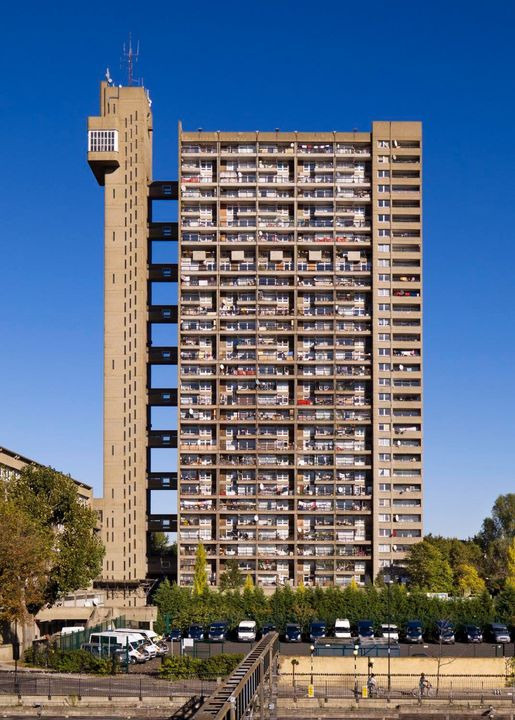
This is Trellick Tower built in 1972 on the Cheltenham Estate in North Kensington, London, UK and designed by Hungarian-born architect and designer Ernő Goldfinger. A 3bd, 1.5ba unit on the 19th floors is for sale for £1,000,000 / $1,248,735.
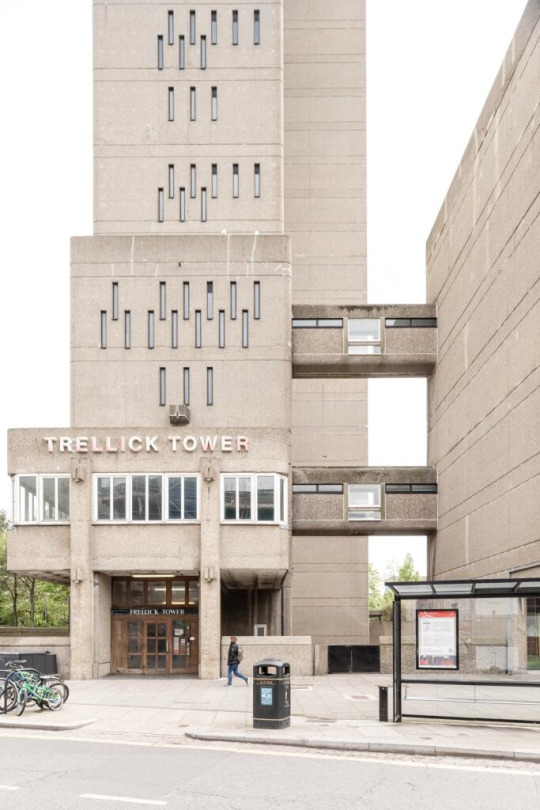
The building is split into the main block of flats and the imposing service tower. To maximize living space, Goldfinger put the lifts, stairs and even communal laundrettes into the tower. The heating system and water tanks are housed there, too, in the plant room at the top, which allows water to run down to apartments using gravity, minimizing piping.

The tower stairs look so clean. Probably nobody uses them.

Yellow lift hallway.

The connecting hall from the lifts to the apts. looks dated.

Since the connecting halls from the tower are on every other floor, this unit's entrance is on the 18th fl. below.

Hall at the top of the stairs.



For the price, this is a small living room.

Opens to a narrow balcony.



The kitchen isn't oversized, but it's nice.

The primary bedroom is small.

This bedroom is being used as a den.
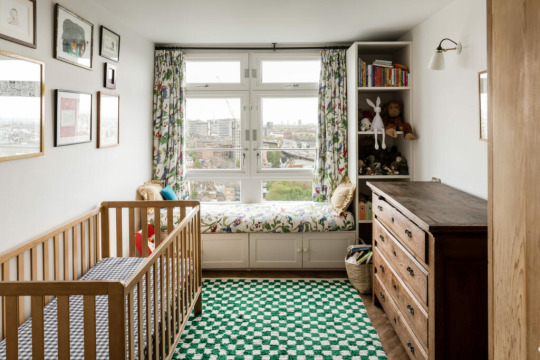
And, this one is a nursery. The window seat is nice, but I don't think that you could fit a bed in here.


The 1.5 baths are right next to each other.

The view.
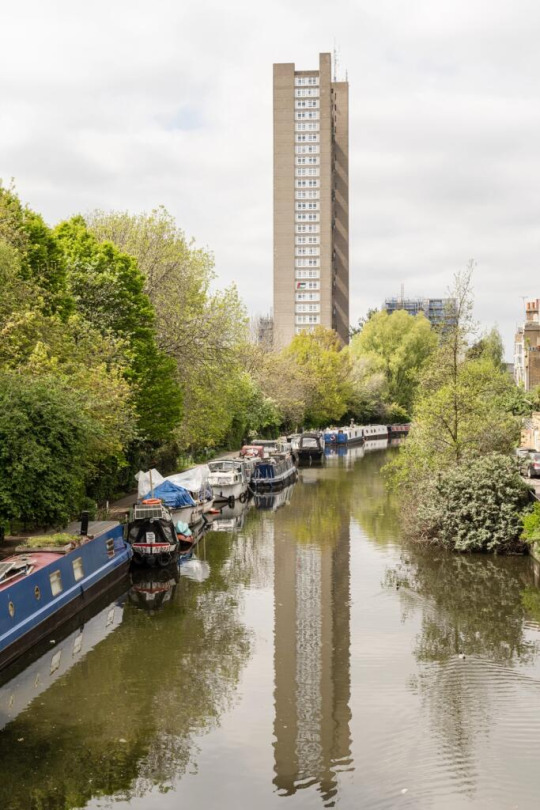
I think that I would rather live in a longboat on the canal. I just don't think that this unit is worth the price.

134 notes
·
View notes
Text
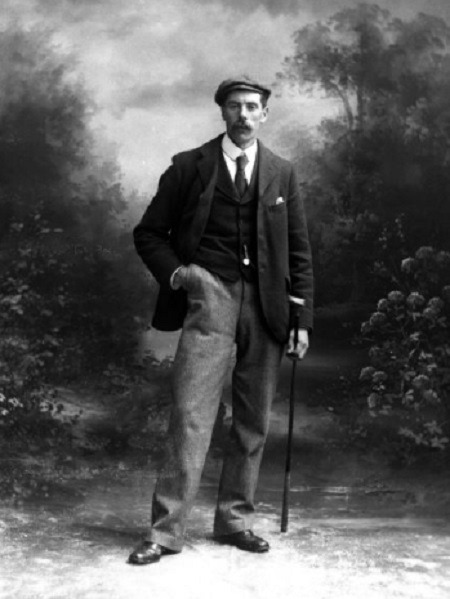



27th November 1950 saw the death of the professional golfer and golf course designer James Braid.
Born at Earlsferry in the Kingdom of Fife James Braid took up golf at an early age and played on the lovely links at Elie.
A carpenter by trade, Braid turned his skilled hands to making and repairing clubs before leaving Scotland to begin club-making at a store in London. Seizing every spare moment to play the game he loved, he steadily improved and, when 26, accepted a job as the professional at Romford Golf Club on the outskirts of London.
As a golfer e won The Open Championship in 1901, 1905, 1906, 1908 and 1910. In addition, Braid won four British PGA Matchplay Championships (1903, 1905, 1907 and 1911), as well as the 1910 French Open title. He was also runner-up in The Open Championship in 1897, 1902, 1904, and 1909. His 1906 victory in The Open Championship was the last successful defence of the title by a European until Pádraig Harrington replicated the feat in 2008. As well as the five Open wins he finished in the top five a further 11 times!
He also founded the Professional Golfers' Association and, in the midst of all his success, moved to Walton Heath, a new course to the south of London, where he remained the pro for more than 40 years until his death in 1950. While at Walton Heath, Braid found time to both write about golf and design or improve more than 200 courses throughout the U.K. Some such as Gleneagles, Carnoustie, Southport and Ainsdale, Boat of Garten and St. Enodoc are rightly famous, while others such as Aberdovey, Berkhamsted, North Hants and Goodwood are perhaps less well known, but still enjoyed nowadays by exponents of the sport.
As well as playing golf and designing courses James Braid also found time to write about it, he first articulated his philosophy in a book called "Advanced Golf," which was published in 1902. Two chapters are devoted to design and are quaintly entitled "The Planning of Course" and "The Character and Placing of Teeing Grounds, Bunkers and Putting Greens." Golf Guide, The Ladies Field Golf Book in 1908 and , How to Play Golf was in 1910. There is also a book about all the courses Braid designed as an architect titled "James Braid and his 400 courses."
Bernard Darwin’s biography James Braid was published in 1952. Darwin knew Braid for over fifty years and offers some keen insights into the man who is described as having “wisdom and a deep and essential kindness.” Regarding Braid’s ability to focus, Darwin describes him, “studying his putts as if the fate of empires depended on them,” even in casual rounds.
Braid disliked travel overseas, very rarely left the British Isles, and never traveled outside Europe, hence no American titles. But he did design two 18-hole golf courses for the Singapore Island Country Club in Asia, using topographic maps to plan his layouts there, which were then constructed to his orders.
Courses in the pic are, in order, The King's course,Gleneagles, Nairn Golf Club, Brora Golf Club, where you have some interesting hazards to play around! Championship course, Carnoustie Golf Links and Craigmillar Park Golf Club.
James Braid died on this day 1950 in Kensington and is buried at Saint Peter's Church Walton-on-the-Hill, England, he was 80 years old.
I like the epitaph on his grave, it reads , ‘He had many opponents but no enemies’
12 notes
·
View notes
Text
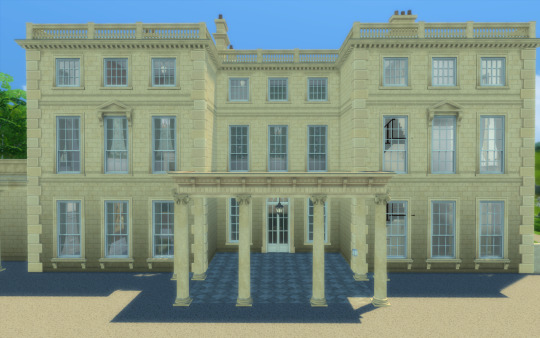
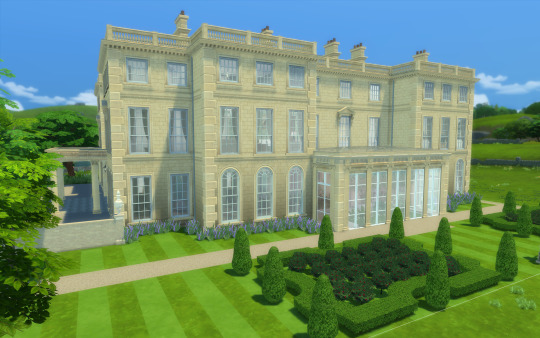
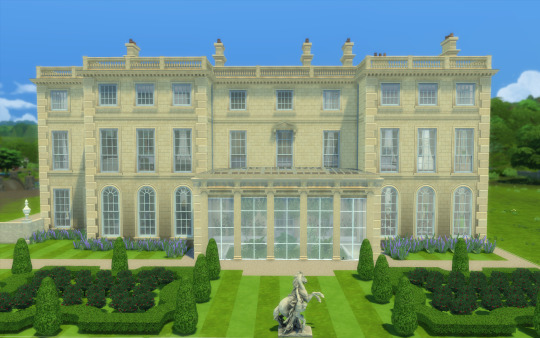
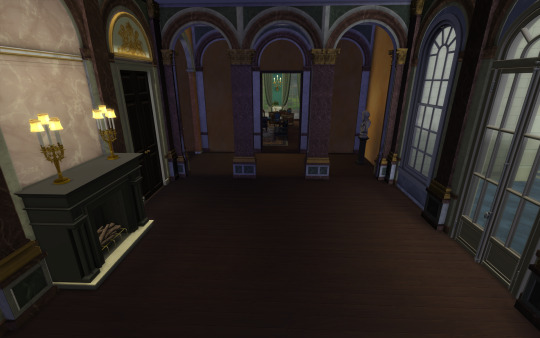
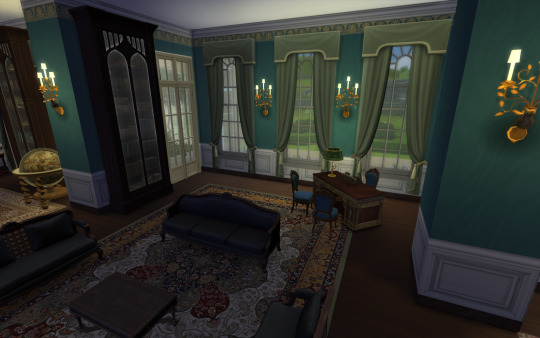
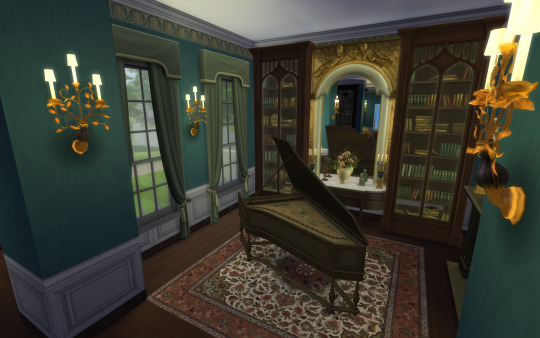
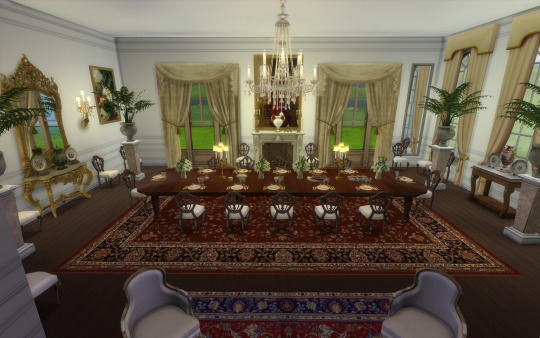
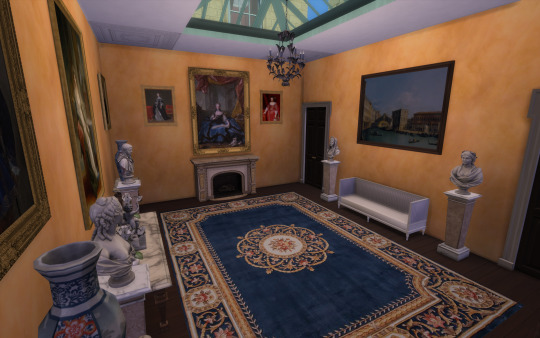

Prestwald Hall
Hi guys!!
I'm sharing Prestwald Hall . This is the 9th building for my English Manors Collection, and I will add many more!
House History: Prestwold Hall was, for many years, the seat of the Packe family. Before that time, it was the home of the Skipwith family. After the death of Major Robert Christopher Packe (born c.1783) - one time Aide-de-camp to King George III - who was killed during the Battle of Waterloo, the hall passed to his nephew George Hussey Packe who held the hall and estate until his death in 1874.
The Hall was remodelled by architect William Burn in 1842–1844, incorporating the fabric of a mid-18th-century H-plan house. It was Grade I listed in 1951.
One of the finest rooms inside the house is the Entrance Hall with its richly coloured marbled plaster work in the Italian style. The painted ceiling was inspired by Raphael’s Vatican grotesques and incorporates miniature landscapes, showing the house before and after its remodelling between 1842 and 1844. Below the ceiling, wreathing the room, are small medallion busts of the poets from Chaucer to Scott, positioned in the spandrels and are likely inspired by Alberti's external arcade at the Tempio Malatestiano in Rimini. An arcade opens on to a vaulted corridor leading to a top lit inner hall: these spaces also marbled. Off the corridor, the cantilevered stone staircase survives from the eighteenth century house, and was given its bracketed brass balusters by William Wilkins (1751-1815) in 1805.
The Dining Room, added by Wilkins in 1805, was incorporated into the remodelling undertaken by the Scottish architect William Burn in 1842. The room is overlooked by two dramatic full length portraits of Sir Edward Hussey Packe, KBE (1878 – 1946) and the Hon. Lady Mary Sydney Packe (née Colebrooke, 1890 – 1973) by the painter Glyn Philpot RA (1844 – 1947). The portrait of Lady Packe, painted in 1911, was described by the art historian Robin Gibson OBE as an ‘amazing feat of virtuosity’. Its elongated elegance and introspective characterisation is totally without the fashion-plate vulgarity of much Edwardian portraiture. Other portraits hang in this room of the Packe family including a painting of Sir Christopher Packe (1595 – 1682) who purchased the house in the 17th century painted by Cornelis Janssens van Ceulen (1593 –1661).
The library extends nearly the entire length of the house when the large doors that separate it from the drawing room are opened, connecting the two rooms. With clever use of constructional steel, William Burn was able to create these long adjoining rooms. The windows rise from floor level and open onto the garden which enhances the notion that Prestwold was designed in the style of an Italian classical villa. The doors and bookcases in library were made for George Hussey Packe (1846–1908) by Gillows of Lancaster and London in 1875.
A conservatory fills the recessed central bay at the front of the house, and projects out towards the garden. Behind the glass and elegant Doric pilasters, are well planted raised beds with a number of exotic plants and flowers
More history: https://en.wikipedia.org/wiki/Prestwold_Hall
Virtual tour: https://www.prestwold-hall.com/virtual-tour/
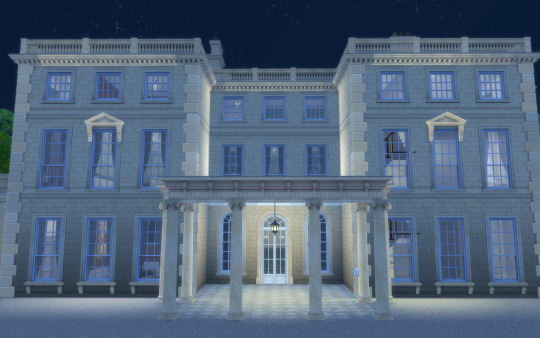
Night pics
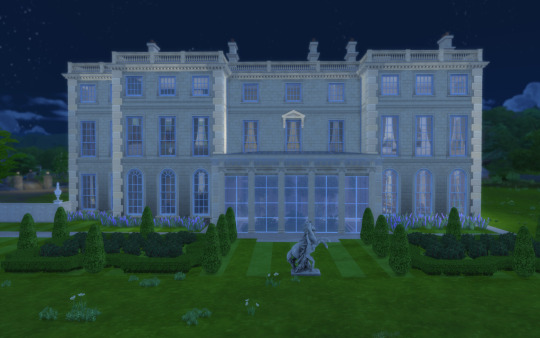


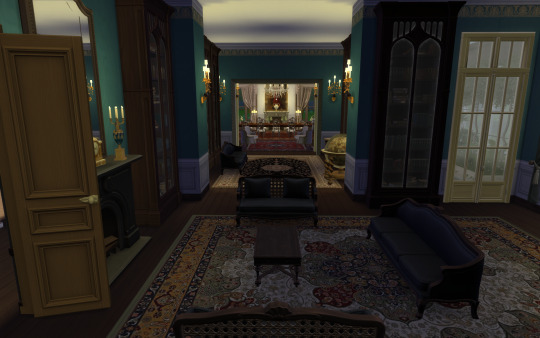
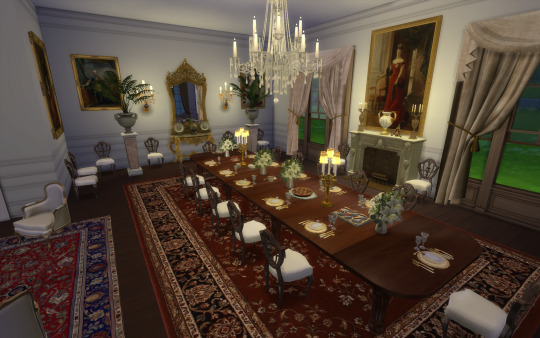
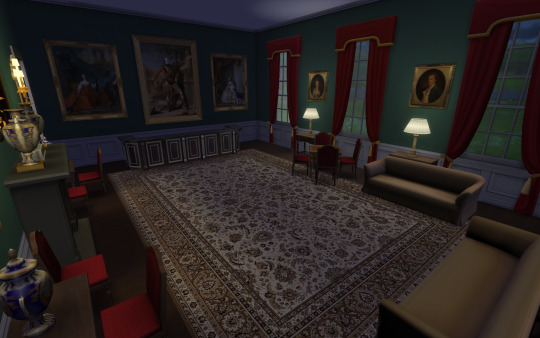
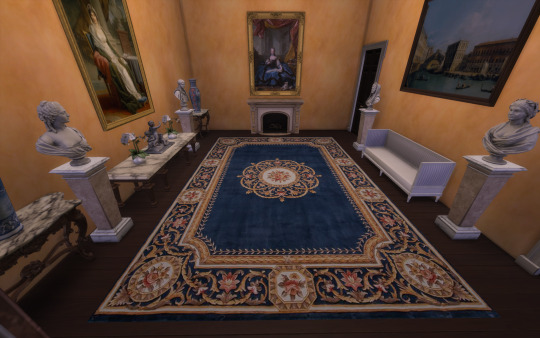
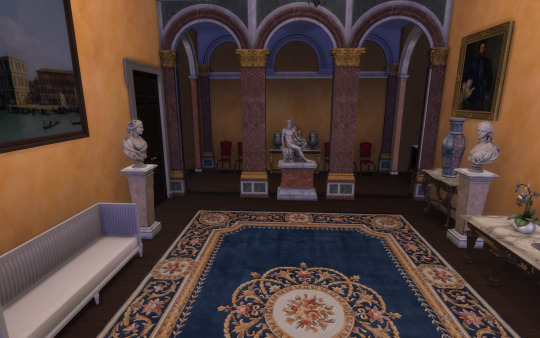
Floorplans




This house fits a 50x40 lot and features the following:
great hall
long Library
formal dinning room
family room
playroom
formal gallery
a winter garden
14 rooms for family/guests + 3 service rooms
several bathrooms
This time I decorated most of the rooms in the main floor for picture purposes, but as allways, you can make it your own!
The second and third floor (bedrooms) are not decorated, but finished.
Hope you like it.
You will need the usual CC I use:
all Felixandre cc
all The Jim,
SYB
Anachrosims
Regal Sims
King Falcon railing
The Golden Sanctuary
Cliffou
Dndr recolors
Harrie cc
Tuds
Lili's palace cc
Please enjoy, comment if you like it and share pictures with me if you use my creations!
Early Access: August 15
Download: https://www.patreon.com/posts/prestwald-hall-104505183
#sims 4 architecture#sims 4 build#sims4#sims 4 screenshots#sims4play#sims 4 historical#sims4building#sims4palace#sims 4 royalty#ts4 download#sims4frencharchitecture#ts4#ts4 gameplay#ts4 simblr#ts4 legacy#ts4cc#the sims community#the sims 4#sims 4
38 notes
·
View notes
Text
hearts don't break around here
There were flowers on her desk. It was a random Wednesday morning, she had just greeted Bleta and some other workers ‘good morning’, and there were flowers on her desk. A whole, entire, huge bouquet of red— Somethings. She had no idea what flowers those were. Worse: she had no idea how they were there to begin with. Or, Percy is a florist that seems to see the world through the colors that he sees everyday — bright, different and slightly utopic. Annabeth, an overly serious architect that works just across a lovely flowershop, and doesn't really look for the beauty around her world and outside her office's walls. When she starts receiving flowers out of nowhere, with notes signed only with an initial, her biggest plan is to figure out who could possibly be sending them. What she doesn't know is that all she has to do is look out the window.
read it on Ao3
The hostile atmosphere of the city of New York was almost palpable for anyone used to being or living there, hardly masked by the illusion of tourists fascinated by every old building lost among mirrored skyscrapers. The cloudy skies that stretched over people's heads and the cold, albeit gentle, breeze shattered the fantasy that the most famous city in the country could be as welcoming as in the films.
It was fun when one stopped to analyze everything that people have been told and what actually happens when you're there to see it. The hostile climate of New York, or the strange cold that surrounds London; perhaps how pleasant it would be to arrive in any city in Latin America, or the tranquil and strangely cultured air in Amsterdam — and how different it can all be when one switches perspectives.
It was fascinating, in fact, how things are put together in such different ways when placed in the same place. How the old buildings gave off a nostalgic air, more because of the strange feeling that they would soon disappear than because of the amount of time they had stood, or how the newer constructions seemed to carry with them an air of boredom and stress more than any possibility of a well-designed future. Fascinating, and rather hopeless.
Or perhaps the boredom belonged not to the city, but to those who lived in it at a rapid pace, with no time to admire anything other than their own misery or unhappiness. People who walk with their heads down, dragging their feet or marching towards what brings them the tragedy in which they sink daily, ignoring the landscape and cursing anyone who stops to do so.
Whatever was the case, the hostile climate was present at every sunrise as the icy gloom was replaced by warm rays wandering through the blinds that enveloped the wide glass windows of a silent office. Although the sun was up early, breaking the dawn, the grey fog that would sometimes take over the entire urban territory still masked its discreet presence for a few hours, cutting through the atmosphere as the city began to come alive again.
On the dark surface of the rough wooden desk, the faint rays of sun flickered in the reflection of the jug of water, and highlighted the white of organized stacks of sheets of paper. A laptop, two pens and a triangular gold plaque also shone against the light, and the silence was absolute against the noise of the cars, buses and a whole society outside the wide, mirrored building.
Absolute, except for the light, brief snores that cut through the air on the other side of the spacious office.
Covering almost the entire room, a fluffy grey carpet stretched under the desk, only to be interrupted a little further on, next to the immense glass wall from where the city of New York didn't appear so dense. The city itself, however, was hidden behind long white curtains of light, diaphanous fabric, the daylight timidly penetrating the mostly dark environment.
Just before them, a set of armchairs and a sofa in the same shade of grey were elegantly positioned around a round coffee table with a translucent glass top that supported a neatly folded jacket and an equally neat engraving on top of it. Next to the table, on the floor, a pair of black dress shoes rested perfectly aligned, and the only thing seemingly out of place was the woman stretched out on the couch.
One of her arms was over her face, covering her eyes to protect them from the daylight. Her hand hung beside her head, turned uncomfortably away from the windows, her nose almost wedged between the backrest and the seat, and her other arm was folded, hand flat over her stomach, partially trapped between two buttons of her white button shirt.
Her chest rose and fell rhythmically, and her lips parted to mumble something that tried to sound like sentences. The shirt was wrinkled, as were the black trousers, and only one of her feet was covered by a white sock — that also seemed to be about to come off at any movement of her feet. The brown braids of her hair were disorganized and seemingly tangled, making an exquisite contrast with the surroundings.
A few more soft snores sounded in the air until they were interrupted by the double wooden door being opened from the outside, followed by the low click of the lock clicking back into place and soft footsteps, which stopped after no more than two soft ‘knocks’ and were accompanied by a sigh. The next moment, the footsteps sounded again against the floor across the room, only to cease again when near the couch.
“You're the most depressing situation I've ever seen,” a male voice sounded, and the figure stretched out on the sofa jerked upwards in fright. Her brown eyes looked around hurriedly, shoulders tense, and the weight of her torso being lifted by her arms, until her pupils caught sight of the person speaking. She relaxed one more time.
The woman grunted, and the man rolled his eyes.
“What time is it?” she asked, bringing her hands to her eyes and rubbing them over the eyelids.
“Too early to come to work and too late to go home,’ the man replied, sighing and turning round to face the arm of the furniture. “You do remember that you have a house and a bed, don't you? Because I didn't spend hours hopping from shopping center to shopping center so that you'd simply forget that you have at least six pillows, Annabeth.”
The woman laughed softly, yawning and throwing her legs over so that they rested against the tiled floor.
“For starters,” Annabeth retorted, stretching one of her arms above her head. “We spent hours in shopping centers because you wanted to find God-knows-what to put in the living room, Grover. Besides,” she groaned, facing her friend. “Yes, I know.”
Annabeth stood up, putting her hands on her lower back and stretching her muscles, grunting before exhaling in relief. Grover rolled his eyes again.
“And what goes on in your head that you decide to sleep on the couch in your office?” he asked, arching one of his eyebrows. Annabeth shrugged briefly and sat down once more.
“Work,” she replied. “And a surprising laziness to drive anywhere,” she frowned, and Grover shook his head in denial. “Besides, Oliott called.”
Grover raised both eyebrows this time.
“Again?” he asked, his voice surprised and disbelieving. Annabeth nodded. “God, that man is unbelievable,” he continued, crossing his arms in front of his chest and shaking his head.
Annabeth sighed, nodding.
“Tell me about it,” she said. “Can’t really blame him, though. I, too, would be desperate if I bought illegal land in protected territory and needed someone to build in it so I won’t go to jail.”
Grover snorted, suppressing a smile, and shook his head.
“Hope he’ll rot, fucking asshole,” he grumbled. “What did you say?”
Annabeth threw her body backwards, leaning back on the couch and leaning her head on the cushioned backrest.
She sighed again.
“The same thing as the other eight times,” she replied. “That we, first, don’t make business with criminals as a firm; second, I don’t design for assholes as a person. And that we don’t have space in schedule whatsoever to take any more projects.”
“We don’t?” Grover asked. Annabeth smiled mischievously, turning her head and resting her ear against the cushion of the furniture.
“We do,” she mumbled, voice filled with childish playfulness, and Grover laughed at how juvenile his friend sounded. “But he doesn't know that. Or he does, but it doesn't matter anyway,” she shrugged. “Can’t wait to turn on the news and see him being arrested.”
Annabeth yawned, then, long and trying to somehow muffle it. Grover, who had been sitting over the arm of the couch, stood up and straightened himself before turning towards the architect, arms crossed over his chest and one of his eyebrows arched in judgement.
“Get up,” he said, and Annabeth — who hadn’t noticed closing her eyes for a second or more after yawning —, stared at him with clear confusion on her face. When she spoke again, another yawn threatened to leave along her words.
“What for?” she asked.
Grover simply rolled his eyes.
“If you don't sleep in your own bed, do you really think I expect you to look after yourself?” Grover argued, and Annabeth waggled her eyebrows and nodded briefly, agreeing. “Come on, get moving. I’m buying you breakfast.”
Annabeth snorted, and Grover walked round to the back of the sofa once more, standing in line with his friend’s head, only to land a light slap near his ear. Annabeth exclaimed in surprise and cursed quietly, laughing softly before getting up and picking up the jacket from the coffee table.
Grover, who was already near the door, waited for Annabeth to approach and grabbed the handle, opening the door and holding it for her to pass through. She, trying to knot the small bow in her shirt while still tripping over her shoes, took long enough so the man would huff and snatch her hands from the failed attempts and claim she needed to breathe, anyway, so she could deal with it later.
Annabeth laughed, following him to the elevators.
[…]
Large urban centers rarely had places that hide from the eyes of passers-byes. Everything was too clear, too crowded, too big — things were always extremely visible, and there were always too many things to be seen, to be heard, to be noticed and talked about.
New York was no different, and perhaps was quite too much that stereotype that Hollywood had established globally. Huge shops with bright signs, crowded shop windows and people who were surprisingly not bewildered by so much information; the city was just a huge anthill of people who were desperate, consumerist, bored or all three, in some cases.
There was a narrow side street, however, between two corners — one with a huge Starbucks shop and the other with a bank — which apparently hadn't been overwhelmed by chaos or huge lights. There, simpler shops with vintage content such as vinyl, comics or clothes that didn’t completely care about following the current strange branding, as well as two restaurants and a cozy coffee shop adorned the weathered pavements. In the center, from one of the pavements, one could access a park that was usually empty.
The café faced the park. Its white façade with sash windows and double wooden doors already indicated the comfort that the bright surroundings gave off, the extensive shelves with books only adding to the cozy impression that spread throughout the place. At the back, where a bay window with light cushions made the café even more inviting, was Annabeth’s favorite place to be whenever she found her way there.
Grover and she had discovered the café a few years before, trying to find somewhere they could study without the chaos outside and the noise of the city driving them crazy or completely out of concentration. She would take her drafts and sketches while Grover took his books and notes — and they wouldn’t speak, simply basking in each other’s company and, more often than not, ordering more coffee than anyone should ever consume in a span of eight hours.
They’d given up the last café they had thought would be a good idea after the fights in the kitchen got too loud and would catch their attention more than whatever they needed to focus on. Sure, Annabeth and Grover loved to know about the chaos — a cheating husband and a best friend and something involving purple dresses, when they last went there —, but, at the time, their finals were nearing and they needed a saving grace.
After a wrong turn, they spotted the façade, which at the time was an aqua green color, and placed one last bet on the place. It was late afternoon, and the orange of the setting sun — and urban pollution — reflected in the windows and accentuated the warm lamps inside the uncrowded and seemingly perfect establishment.
After that day, when they met River, Nicholas and Naomi, who worked there, the two of them decided that it was the right place for them to meet and, since then, that little café — which, honestly, none of them can remember ever asking what it was called — has become one of the best places in the world for unwinding and spending time with a good book.
With time shorter and shorter for them to be there as more than a passage to get coffee, the pair tried to make most of the occasions in which their schedule wouldn’t get in the way of enjoying each other’s company. Sometimes Juniper, Grover’s fiancée, would join them, as would Thalia, one of their best friends. River, Nick and Naomi — who were teenagers fresh into sophomore year when they first met — would also join the conversations whenever they could.
When Grover dragged Annabeth out of the firm, she already knew where they were going, and dropped her jacket on her friend’s car instead of putting it on as she usually did. The man had removed his jacket on the way, while humming any song on the radio and commenting on any news — gossip, if Annabeth was being honest — that was going round the building's departments.
Nicholas greeted them as they entered the cafeteria, always with his animated face that looked like it belonged to someone who hadn't slept in days and said that he would take care of their usual orders — with a little treat on the house, since they were the first customers of the day, as it was usually the case. The pair thanked him, walked to the back of the establishment and took their seats around one of the round tables, the one in front of the bay window.
It was a pleasant view, as the property extended a little further into a small yard surrounded by live fences and various flowers, always well looked after. There were a few tables dotted around, as well as ottomans surrounding lower tables, and the atmosphere was something straight out of a publisher’s portfolio. The hedge divided the café from a costume shop — old, she knew — and a vinyl record shop that Annabeth could not deny having fallen in love with at first sight.
Just a couple of minutes later, Nicholas returned with their favorite coffees on a tray and a smile on his face — for no reason, as the pair knew after so many years. Grover fidgeted in his chair, eager for his first caffeine fix of the day, and Annabeth simply shook her head with a soft giggle.
“A double espresso for you, sir, and a flat white for the beautiful lady,” Nicholas announced, changing his voice to a falsely dismissive tone as he spoke to Grover, and gently tapping his saucer against the table, only to turn to Annabeth, speak with false pomposity and then bend down to place the order in front of the woman.
Annabeth chuckled, and Grover simply rolled his eyes.
“One of these days, I'm going to rat you out to your manager, kid,” Grover grumbled, bringing his cup to his lips and holding back a groan of satisfaction when the strong drink came into contact with his tongue. Nicholas' smile widened, and Annabeth gestured with her hand as if to say that it was just an empty threat.
“Oh, yes; of course,’ Nicholas said, mockingly. “You love me, Grover. You should stop denying it to yourself,” he said, followed by a wink, and Annabeth pressed her lips together not to laugh.
“There's nothing to deny if what you say are lies,” Grover shrugged, and Nicholas made a false expression of offence. “Besides, I've never denied that River has always been my favorite,” he mocked, and Nicholas frowned in fake indignation.
Annabeth took another sip of her drink. And before the waiter could reply, she spoke:
“Where is River, by the way, Nico?” she asked. “You always arrive together,” she pointed out, and Nicholas made a move to tuck the tray under his arm, smiling with satisfaction at whatever he was going to say next.
“Belgium,” he replied, and Annabeth stopped the cup in mid-air, halfway to her lips. Grover straightened his back and narrowed his eyes, while Nicholas just shrugged. “Or on a train on the way to Belgium; I don't know the exact situation.”
“Belgium,” Grover said. “As in the country? In Europe?”
Nicholas nodded happily. Annabeth cleared her throat.
“And since when is River in Belgium?” the architect asked. “Why is he in Belgium on a Thursday morning when we saw him yesterday afternoon?” she frowned.
“Has he finally realized that the world isn't so big when you have money?” Grover asked, also with arched eyebrows.
Nicholas simply shrugged.
“About your question,” Nicholas pointed at Annabeth with his head. “Since last night, apparently. About yours,” he pointed at Grover in the same way. “I think the answer goes together with her other question. The world is definitely not as big when you have money and that, in a way, makes it easier when you want to run away,” he shrugged again, his animated tone faltering a little.
They knew River well enough to know what it was all about. And Annabeth personally understood all too well why the boy had taken a ticket to Belgium in the middle of the night.
“It took him longer than I thought it would, for him to do something like that,” Annabeth said, her eyes downcast, staring at the drawing in the foam of her cup. The two men agreed in silence. “And let's be clear that I'm referring to running away from those two as much as filling that pocket with money and going anywhere in the world. Although, frankly, I always thought he was going to take a boat,” she joked, lightening the mood in the room.
“I think we can all agree on that,” Grover said. “I've never seen anyone so insistent that packing up and travelling around the continent wasn't the best thing to do on a gap year. I'm glad he gave it a chance.”
Nicholas squeaked in amusement.
“Tell me about it,” he agreed. “I nearly put him on a plane myself. Imagine having the world in the palm of your hand and spending your days in a lost coffee shop in the middle of New York! I mean, he can do the most incredible things on this trip! See the Colosseum, the Louvre, the Parthenon, that hooped thing in Warsaw-
“Segovia Aqueduct,” Annabeth interrupted, and Nicholas chose to ignore her.
“... Pantheon, Arc de Triomphe, Eiffel Tower...” Nicholas listed. “And along the way, he could meet the love of his life. Imagine that!”
Grover laughed.
“Why do I think you and Naomi bet on that?” he asked, and Nicholas smiled mischievously once again. “For God's sake, Nico! What are the chances of River simply bumping into the love of his life on a train to Belgium?!”
“There are!” Nicholas argued, and Grover laughed even harder. Annabeth followed, taking another sip of her coffee. “Hey, don't you even start. What were the chances of River travelling anyway? Even more so in the middle of a Wednesday?!”
Annabeth tilted her head slightly to either side, agreeing.
“Well, yeah. You might have a point,” she said, and Nicholas smiled. “And you also have access to food,” she smiled, amused. “And food is always a good idea, don't you think?” she suggested, and Nicholas rolled his eyes before turning in his feet and walking towards the counter and the kitchen.
Annabeth lifted her wrist to look at her watch, then picked up her cup again to take a little more of the drink. After a few minutes, the architect felt a pair of eyes burn into the side of her face. She turned her head around to find Grover, leaning back on his seat, his elbows resting on the window ledge, legs crossed and a look on his face that Annabeth honestly didn't know if she wanted to decipher.
“What's wrong?” she asked anyway. Grover arched one eyebrow again.
“When are you going to give yourself a chance?” he asked, his serious tone and frank countenance staring into the confused expression of his friend, whose frown deepened at the environmentalist’s words. “Just like the one you’re glad River gave himself.”
Annabeth squinted, a little because of confusion over the last sentence Grover had said and a little because of the context of the sentence itself. She also threw his body back, leaning against the comfortable cushion, but leaving her head raised so that she could face the man in front of her.
“I like New York,” she said, as if that were some kind of explanation. “And I've lived alone for years, which frees me from any River-like motives.”
Grover rolled his eyes and grunted.
“You know very well what I mean,” he said, and Annabeth cocked her head to one side. Her friend sighed again. “You live for work, Annabeth, for God's sake. When was the last time you agreed to go out with anyone? Or by yourself?”
“Now?” she asked, pointing her finger at the table, and Grover bit his tongue. “Grover, I'm the director of the firm. I sort of have to work a bit harder than the others, and you know that.”
Grover nodded, but his pose remained the same.
“Oh. ‘A little’, you say. I'd like to emphasize it, then. You've been abusing any hyperbole or augmentation for years,” he retorted. “And it's not just going out with me, Annabeth. When was the last time you had a decent night's sleep in your own bed? Or the last night you even went to bed?”
The architect opened her mouth to say something, but Grover didn't let her speak before taking the floor again.
“When was the last time you left the house without a suit? Or the last time you, I don't know, met someone who wasn't a client?” he asked, and Annabeth chose to close her mouth. “Annie, when was the last time you ever flirted with someone?”
At the last question, Annabeth frowned again. Grover arched his eyebrows again, tilting his head slightly to one side and waving his foot in the air under the table where his legs were crossed.
“And what does that have to do with anything?” she asked, and Grover just sighed loudly, shaking his head. “What does it have to do with anything? I’m serious!”
The man sighed.
“I know! That's even worse,” he pointed out, raising his hands in exasperation. “Do you plan to spend your whole life being miserable and lonely and solving other people's problems?”
Annabeth opened her mouth in indignation, and Grover just lifted his chin, his lips twisting in defiance.
“Ouch,” Annabeth said, placing one hand over her chest. “I'm not miserable, G-Man.”
And if she pouted, Annabeth would deny it completely.
“Hm,” Grover muttered before reaching into his bag and slipping his hand inside, taking out his mobile phone and unlocking it. Annabeth frowned again, alternating her gaze between the man’s face and the mobile phone he was skillfully typing on until he smiled briefly and cleared his throat. “Hm. ‘Miserable’. Adjective and noun of two genders: ‘who or that which, by its misfortune, arouses compassion’,” he recited, and Annabeth sighed briefly before crossing her arms over her chest, too. “There's even a picture!” Grover exclaimed.
Grover turned the mobile phone towards Annabeth, and it took her a few seconds to notice that her friend had switched it off and there was only the black screen reflecting her twisted, confused face. The man had a proud, smug smile on his face, and Annabeth just snorted before pushing Grover’s arm to get the mobile phone out of her face.
“You think you're hilarious, don't you?” Annabeth asked, and Grover nodded in agreement. “And despite your blatant offence towards me, I appreciate your concern, but I don't need any advice. I’m fine, Grover,” she said, his tone serious and extremely formal.
“I know you are, I can see that,” he said. “But being fine doesn't cancel out being miserable, Annie. Come on, haven't you ever wanted to fall in love with someone? I know you have. We grew up together,” Grover said, and Annabeth settled a little further into her seat. “To be given flowers, to smile for no reason, to have someone to hug or to tell unfunny jokes to?”
Annabeth mumbled something, but spoke again before Grover asked.
“Doesn't that sound too cliché? Sugary?” she asked, and Grover just shrugged.
“Love has been love since the world was a world, Annabeth. It may sound repetitive in theory, because it is the theory,” he argued. “What really changes is that you're the one feeling it.”
She arched an eyebrow. And chose not to comment on the poetics, given the smile so sincere on Grover’s lips — thinking of Juniper, she knew, because the glimmer in his eyes was quite obvious.
“And what's so special about that?” she retorted, and her friend merely repeated her previous gesture, but leaned forward to reach for his cup again.
“Love is a universal concept, but this one anyone could call their own,” he said. “Which, you must admit, is quite something,” he sipped his drink. Annabeth just shrugged, imitating her friend and picking up her cup as Nicholas returned from the kitchen with another tray, spouting words that the two of them were still too slow to decipher.
As she ate the slice of cake Nicholas had brought — and I'm sorry it took so long, but I forgot to make it part of the sweet display and I really don't need to be sacked now, so close to my first semester of Med School — Annabeth pondered some of Grover’s words.
Smiling for no reason? It sounded merely silly. Having someone to hug? Sometimes... It would be nice, but it also sounded too trivial to have at the cost of a possible heart. Telling unfunny jokes? Isn't that what she's in that friendship for starters?
And to receive flowers?
Annabeth laughed to herself.
It was too sweet — and the hope was too foolish — for it to ever happen to her.
“I don’t even know why you brought ‘falling in love’ up, Grover,” she said, then, suddenly. Her friend took his time to savor the piece he was taking to his mouth and ignored her for a minute before swallowing.
“Because I saw your face when Nico joked about River finding love in a train, dipshit. I know you better than you know yourself.”
And she didn’t know how say anything back to him, because there was no way she could deny it, either. Tragically, Annabeth hated to admit, she was a romantic — and she would often daydream of meeting someone and being enchanted and going through every single cliché on the book.
She shook her head, ridding it of the stupid thoughts, and focused on her cake again.
As they left the café to return to the firm, Annabeth left the conversation, her thoughts and unfounded hopes hanging on the glass of the bay window, hoping that the wind or the passing of people would blow them away.
[…]
Sometimes, he believed New York was quiet for the big city it undoubtedly was.
Of course, there were lights and noise, and people walked around in their own misery all the time — but it was calmer, from where he stood, because the anguish didn't seem to be constantly in the spotlight. There were more trees here and there, and one could hear the birds every morning, as well as dogs barking and whatever it was that seemed to be screaming when the sun comes up.
The streets, at least the newer ones, were wide and full of lights, and were crowded as the daylight shone down on them, penetrating through the clouds and shining on the buildings — but quietened down as the moonlight began to replace the golden glow with a pale, soft glow. Things seemed to get a little quieter, and the pace would slow down significantly, making it seem as if the great city had had the courage to fall asleep.
The New York he lived was quiet for a big city; it was.
It was the first thing that crossed his mind whenever he woke up in the morning or in the middle of the night, and one could hear the crickets sharpening the silence around the streets. If he tried hard enough, he would be able to hear the sleeping city itself, a few cars and motorcycles from time to time, some owls hiding from the remaining lights of the streetlamps.
It was a feeling he had forgotten he could ever feel — if he ever had, because growing up in central New York takes away most of the sense of silence. It was soothing, most of the time, and it helped whenever he couldn't fall asleep after a busy, hellish or chaotic day.
Because, even if New York was quiet for a big city, he could count on his fingers the number of slow days he'd managed since work had started again.
And wasn’t it surprising when one worked at a flower shop?
Switching on his cell phone, then, Percy kept a quick pace out of his house, the headphones now loud in his ears and his eyes straying to the hour on the screen once more. He sighed, and his fingers tightened the strap of his bag over his shoulder, his feet moving a little faster.
And, because his New York was quiet for a big city, it was easy to dodge the crowds as he walked through the people occupying the streets. The sidewalks were long and, although crowded, there were far fewer people than Times Square when it was summer or the very end of the year.
The drier weather, however, was something Percy still longed to get along with ever since he had mover further from the coast — Montauk, where he spent so much of his childhood and had yet to see for a few years, now. While the streets of New York were crowded and always in motion, the coast always had a gentle breeze every now and then, passing over people's heads and through their clothes as they walked in the shadows of the buildings made. The heat seeped in, the sun being reflected by gigantic buildings, which left the air humid, almost sandy.
The very core of New York, on the other hand, was not hot, but dry — and Percy should have gotten used to it by now, but his muscles always felt uncomfortable, his nose often ran, and his brain would most likely stop working when the clouds declared a truce.
Juniper would always make fun of him, as would his mother — but sometimes she also faced the same problems with the cold and drier weather. And then Paul would make fun of her, because someone who did grow up in central New York shouldn’t be so unused to its weather, regardless of how many years she’d spent on the coast.
Those were funny interactions — except for the time Percy nearly had an asthma crisis, and his father nearly snatched him to Greece just for good measure (with his mother’s permission, that was) — that made him laugh every time he remembered them, especially on the way to the flower shop, not far from his apartment but not exactly near it either. Percy held his breath whenever a funny comment came to mind, so as not to look completely crazy while laughing in the middle of the street, especially when he was half-running to where he needed to be.
In less than fifteen minutes — running and bumping into a few people — Percy was already able to see the mirrored building opposite the flower shop. The building, an architecture office, was a huge construction with large windows and busy people, although he never paid it any attention. The flowers and the people were better to look at than a skyscraper with ties and walking headaches.
Apart from that, the architects and engineers who worked there rarely stopped their busy day to talk to anyone — and Percy could swear he'd never heard any of their voices in his entire life. Overall, he could understand; the firm was always bustling with clients and he supposed that being stressed was just a direct consequence of it.
But he doubted it to be completely true even more after meeting Grover, who was more of an angel than a real person.
The point was that he had met him before, through Juniper’s stories, the sighs of love and the moon eyes at the mere mention of her fiancé. In later conversations, the shop’s team discovered that he was an environmentalist and worked at New York’s newest influential architecture firm — which wasn't exactly a surprise, as Juniper talked about him as if he were Superman.
And Percy, although he worked at the shop his entire life, never paid enough attention to see either Grover or Juniper entering or leaving the mirrored building. Neither of them did pay attention to the flower shop, either, and it was a funny Tuesday morning when Grover entered the store only to bump into Percy’s presence behind the counter.
The environmentalist was leaving the mirrored building early and walked to the flower shop as soon as Juniper let him know she was there. It was flattering how he smiled, and even more so how his comment about how much he had heard about Percy gave away how much Juniper cared about him and the whole team — but the florist couldn't help seeing the woman nearly explode in embarrassment when he offered Grover an entire bouquet.
The man’s ears turned red, and Percy believes that was the moment they decided to be best friends.
Ever since they met, then, on Tuesdays, Grover would show up with or without Juniper — the days she didn’t work —, just to chat or keep Percy some company when he wasn't buried up to her neck in piles of paper and work and stress. Sometimes he would talk about how crazy things were, or how much his best friend, who worked with him, could annoy the life out of him — and Percy would doubt it, of course, because Grover had the patience of an angel and a mocking tone in his voice while he pretended to hate whoever she was.
It was one of Percy’s favorite friendships, if he was honest. Of course, it wasn't rare or difficult for Grover to be someone's favorite person — Juniper herself was the most obvious example — but it was a delightful experience to know and feel that he was also one of his dearest friends.
But about the mirrored building, that was all Harry knew — Grover. And some of the gossip that went around, of course. Like how Hawks cheated on Bernardez with his superior, Minelli, and still refused to admit that he wasn't one hundred percent heterosexual. Or even how Mendes got angry and broke a few things when Levesque was promoted in his place.
Percy didn't know any of them, but it was particularly amusing to hear Grover tell him with such a conspiratorial tone in his voice. It brightened up his days and got him out of his own head sometimes.
Which was always useful, of course.
Taking the last few steps to the store and slowing down, Percy smiled as he approached the horizontal white wooden fence with vertical black metal bars, stepping onto the wooden walkway that crossed the well-tended garden. Percy tightened the grip on the strap of his backpack, looking around and waving to a couple sitting at one of the tables before stepping through the doors into the cooler atmosphere.
The large windows around the wooden walls gave the flower shop a comforting clarity, and the sophisticated building seemed cozy with all the flowers around it. The arrangement of the tables, the frames, the bouquets, the lights and how warm the whole place seemed — even with the air conditioning on — made it Percy’s favorite place in the whole world.
It was a friendly and danger-free environment, as if nothing outside it could reach anyone inside. The flowers seemed to be a reminder of how much beauty the world could hold, and sometimes being there was all he needed for the tightness in his chest to ease.
“Ma?” he called out, walking up to the counter. Harry put his bag on a coat rack while he still didn't go to his own locker, also picking up the apron he had hung up the day before.
As soon as the apron was around his neck and waist, an older woman came out from behind one of the wooden walls in the middle of the flower shop, with a small flower in a small vase in her hands and a fond smile on her face. Percy arched an eyebrow, a small smile on his face too, and waited for her to notice him.
Sally Jackson was a lovely woman, someone who seemed much younger than she actually was. The only wrinkles on her face were scars of smiles through time, and the kindness of her expression would fool anyone to how much pain the world could hold — and that was something Percy grew up admiring and looking up to. His mother would always have a smile to offer and advice to share with her flowers and whoever needed to hear it, and her arms were the most welcoming place for anyone to ever step into.
The flower shop was practically her home, although Percy obviously knew that Sally didn't live there — anyone could be fooled, considering that she never seemed to leave. She always seemed to be at peace as she strolled through the bouquets and flowers, and everything there seemed to revolve around the woman; the place felt like a safe haven, and the feeling of “home” hung in the air for anyone who wanted to breathe it in.
Percy always took a deep breath, then, and exhaled slowly each time his demons and the noise seemed to try to reach him. The mixed scent of all the flowers could be a little nauseating at first, but the contrast with some other citrus plants would make his lungs feel as fresh as if there was the purest oxygen passing through each of his pores. It was safe, welcoming and almost addictive.
And his mother didn’t ask questions when Percy seemed to breathe more deeply than necessary, and simply invited him to take a walk, taking him away from the throng of people coming in and the noise they carried. It had always been that way; she wouldn’t press on the hurtful matters, trusting him to come to her whenever he felt ready to — and how he loved that woman and everything about her nature.
Most of the time, the days at the flower shop passed the same way — a warm mist covering the dim, welcoming sunlit room, and one of them, lost in their own head, wandering around the flowers as if there were no evil within those walls. A smile would remain on both their faces, suddenly, for no reason, with no time to leave, and it would simply be easy to be there.
Sally kept walking to one of the display tables, but she didn't hear Percy’s greeting as she looked at the flower in her hands. The man arched an eyebrow, placing one of his elbows on the counter and pressing his hip against it, crossing his legs in front of each other as he stared at her.
Percy waited, and it took about three minutes for Sally to look around, searching for something. The man shook his head, stepping away from the counter and then stretching out his arm to reach one of the tools underneath it, on one of the shelves. When his hand reached the pliers, Percy walked closer to his mother, not bothering to call out to her, but just to place the tool closer.
“That’s it, that’s it,” she muttered to herself, accepting the pliers and not sparing a glance at her son, who swallowed a laugh and put his hands behind his back, watching curiously as she cut some branches and leaves from the plant's stalk.
“Which ones are those?” Percy asked, observing the yellow-brown flower that looked a lot like a sunflower in a strange way. Sally, who was concentrating on her task, only answered after a few minutes in silence.
“Gaillardias grandifloras,” she replied. “Also known as Spanish lace,” she said again, and Percy smiled a little at the new piece of information he had been offered.
“And what do they mean?” asked the man, and she let out a happy sigh at that question. It was almost a rule by now that any new flower would result in those two questions coming from Percy, and the flower shop owner couldn't say that it bothered her at all. If anything, it flattered her more than life — that her child grew up to remain as curious as he had been as a little kid.
“Modesty, charm, happiness,” his mother replied, and Percy smiled. “Joy of being together, too. It's a subtle option to give to friends or to that person you have a crush on and never dare say a word about,” she added, and a brief laugh escaped Percy’s lips.
“Not a problem I have, luckily,” Percy joked, shrugging softly.
“Yet,” Sally laughed, the sound soft and charming as Percy always remembered it to be. “I'm counting the days until you climb the walls and want to leave early because there's a pair of eyes you can't get out of your head,” she said, and Percy could only roll his eyes affectionately.
“Where did that come from, uh?” the curly-haired man asked, turning his body when the little bell on the door sounded and looking again at the woman next to him when the guest dismissed his help with a smile and a wave of one of his hands.
His mother, eyes so kind and smile so sweet — welcoming and proud and teasing when looking at him, as if, even if Percy was able to do wrong, there was nothing but goodness in his soul —, shrugged.
“I just have a good feeling, dear,” she decided to say “That love is in the air,” she nearly sung.
Percy arched his eyebrows again.
“Oh, really?” he asked. “And what makes you feel that way?” he wiggled his eyebrows, and Sally smiled, lifting the flower in her hands and smiling at it, ignoring Percy’s condescending look.
“The flowers, Percy,” she said, inhaling the sweet scent close to her nose. “All the flowers,” she added, and Percy couldn't help but smile along with her.
“Let's hope they listen, then,” the man said at last, turning once more as the bell rang again and a trio entered the store. The girl saw him, and Percy smiled, waiting for them to approach so that he could greet everyone. “And you should stop behaving this mystical. Soon enough you and Juniper will be hosting a summer camp to clean souls and vibes.”
“The flowers will listen,” she said. “And you act as if you wouldn’t be right in the middle of the summer camp trying to pretend that you’re the Lord of the Waters and can communicate with fish,” she added in a sharp, teasing voice, narrowing her eyes and causing Percy to stick out his tongue. “Insolent.”
Before he could vocalize his apologies, however — because he was a good son, excuse him —, his mother smiled, and the man just rolled his eyes, knowing then that it had been a joke; mostly.
Sally slapped his arm softly, and Percy took a few more steps, catching up with the group that had entered and stopping after a while. He smiled sweetly, but also frowned when he noticed one of the boys and the girl teasing their other friend, pointing at flowers, and then making a low joke that would give anyone the impression that the boy wanted to disappear.
“Good afternoon, ladies and gentlemen,” said Percy cordially, interrupting the group dynamic a little. “Can I help you today?” he offered, and the boy who was being teased swallowed dryly, clearly nervous about the florist’s presence there.
read the rest on Ao3
#percabeth#percy jackson#annabeth chase#my writing#percy jackon and the olympians#pjo#pjo fandom#fanfic#justapoet writes
8 notes
·
View notes
Text
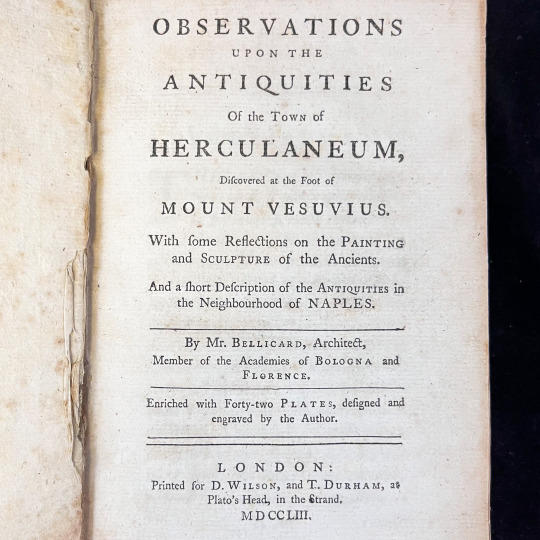
One of the highlights of the eighteenth century was the excavation of the cities buried in ash by the eruption of Mount Vesuvius in 79 A.D. French architect and engraver Jérôme Charles Bellicard explored one of these remarkably preserved cities, Herculaneum, in 1750. Bellicard published his findings and engraved illustrations four years later in Observations sur les antiquites de la ville d’Herculanum, the first illustrated account of archaeological findings at the site. The Noel Collection has an English edition of this fascinating early glimpse into ancient Roman art and architecture as modern-era excavators began brushing away and dislodging the volcanic ash that had preserved the city for 1,600 years. These discoveries inspired the Neoclassical revival in European art and architecture.

Bellicard’s illustration of Mt. Vesuvius as he observed it in 1750, accompanied by a diagram by which Bellicard explains the terrain and vents surrounding the volcano at the time.
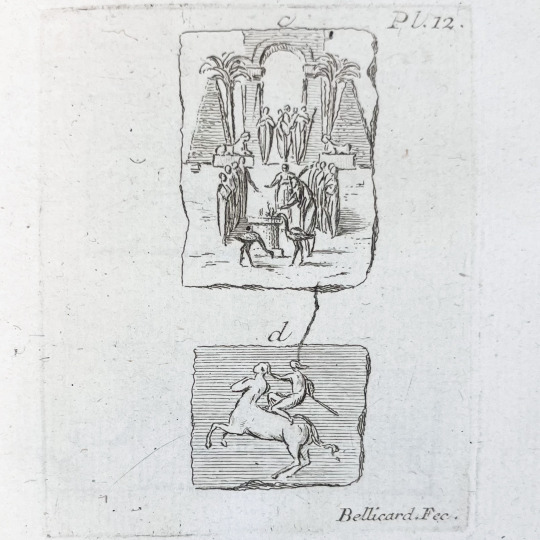
Sketches of preserved Roman paintings, including a scene of an Egyptian ritual sacrifice with a pair of ibises in the foreground (Figure C).
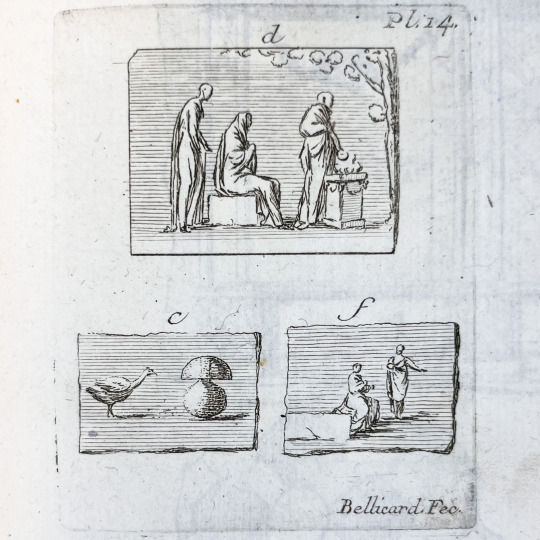
Three pieces of bas relief in marble. Bellicard was particularly impressed by the artistry of Figure D, which shows an old man offering libations.
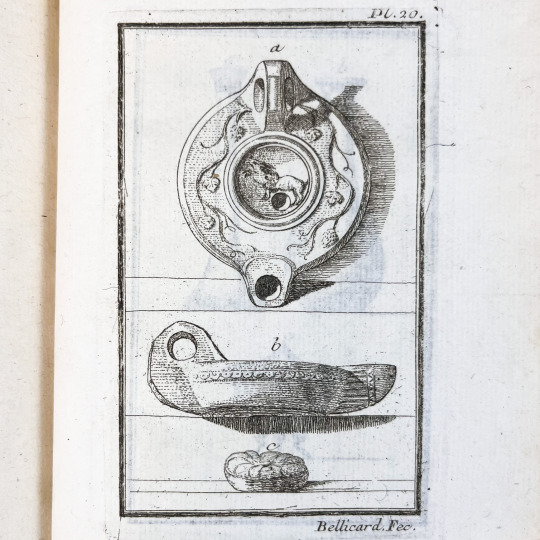
The top and profile view of an earthen lamp as well as a loaf of bread (figure C at the bottom), which Bellicard describes as “one of the greatest curiosities of that unfortunate city, for, although blackened, it hath not lost its shape, nor the impression of the letters upon its top.”
Want to learn more? Check out Bellicard’s manuscript notebook, which has been digitized in full by the Metropolitan Museum of Art.
Images from:
Bellicard, Jérôme Charles. Observations upon the Antiquities of the Town of Herculaneum. London: D. Wilson and T. Durham, 1753 [i.e., 1754]. Catalog record: https://bit.ly/3WzjkpO
116 notes
·
View notes
Text
London Design & Build: Top Contractors for Architectural Design in Fulham & Beyond

Looking for reliable and experienced contractors to bring your dream projects to life? Look no further than London Design & Build, recognized as the Top Building Contractors in London. We specialize in delivering high-quality Architectural Design Services, combining innovation, precision, and a client-first approach to create stunning spaces that meet your needs and exceed your expectations. From residential to commercial projects, we’re dedicated to transforming visions into reality with unmatched expertise. Learn more about our journey, values, and commitment to excellence.
For More Informations Contact us : +44 7982 573 218 Or [email protected]
#Top Building Contractors in London#Architectural Design Services London#Design & Build Services#Building Contractors#Double Storey Extensions#New Build Contractors#Rear Extension#Side Return Extensions#New Build Architects#Flat Conversions#Velux Loft Conversion#House Extensions
1 note
·
View note
Text

#structural engineering company#architectural design solutions#residential structural engineer near me#structural engineering for architects#structural engineer london#structural steelwork fabricators#structural steel detailing services#top structural engineering firms uk
0 notes
Text
My thoughts on.... Jonah Magnus (DONT ARCHIVE)
Jonah Magnus|Elias Bouchard - Pansexual biromantic switch
So this is totally my headcanon and you can be like
BAH, THIS IS NOT WHAT I THINK!
If so go somewhere else.
But I think Jonah was quite the dissipated rake back in youth pre institute days. He fucked men, women and those he wasn’t sure about. While he doesn’t exactly LIKE women or men for that matter. He enjoys the ‘charms’ of women’s bodies: Tits, ass, hips, pussies, legs. But does harbor in his heart of hearts some very sexist notions about them. He likes eating pussy, the smell, the taste, the reactions he gets from the person who’s pussy he’s eating. Not only did the beholding help him with this but he has enough experience. He loves having power over people, which is why he gets off on it and deeply enjoys using his hands and mouth to do so. Oh yes, he loves fellating as well for the same reasons. And while he NOT as unenlightened about men’s abilities he’s a smug cunt who thinks he’s above his fellow man, due to his intelligence, class, beholding avatar and all it entails. With men he likes bottoming mostly and loves rough sex with rough trade, having his holes absolutely destroyed, especially by those with MASSIVE COCKS. Also if a man with penis wants him to Top or blow him he’s not about to turn that down.
Back when Jonah was in original vessel and young he was scandalous AF, not only for the rumors about his thirst for occult knowledge but all other things he got up too, drinking, boozing and fucking anything that stood still long enough. He lost his homosexual virginity to an upper class men at Eton at 13, and later his ‘heterosexual’ virginity to a chambermaid who was roughly his age at 15.
He sired seven bastards (only half survived to adulthood and he was only aware of five until the watcher’s crown) including a daughter on his mistress, the younger sister of a former friend who he seduced and eloped with during a summer visit, who he kept with false promises of a marriage. He financially supported the one he KNEW about that was about as far it went. His tumultuous affair with lord Byron was just a small chapter in both of the scandals of both their lives when it ended Byron burned all the letters. Jonah kept them.
Also the rumors he once hired a half dozen ‘sailors’ (rough trade) rented rooms in a bad part of London to spend three days boozing, drinking and getting gang banged by the rough trade (another rumor that was confirmed much later). As well as the rumors he was supplementing the meager second son allowance his father provided with offering discreet caning, birching and flogging to certain gentlemen.
All of this was before he founded the Magnus institute. What a busy, busy boy!
His affairs with his male friends, who he corresponded with including the late unfortunate Barnabas Bennett, famous architect Robert Smirke are merely hinted at by the flowery, intimate, homo social writing style of the day.
Apparently he was also screwing his Valet in middle age and attempting to sire a ‘vessel for the beholding’ on a female servant of the beholding…this ended with her murder by said valet and the fetus they created discovered during her autopsy was liberally dotted with eyes… it is one the many curiosities he keeps in his office if you know where to look ;)
Anyhow Jonah discovered through the many decades that his basic drives: hunger/thirst, sleep sex, etc. are controlled by the vessel he’s in while his eldritch nature can provide more stamina to delay the need to eat or sleep but they don’t end it entirely and eventually he will need a meal or a good night’s sleep.
The sex drive well that’s ENTIRELY controlled by every vessel’s own unique hormonal cocktail.
Some have had low sex drives, some middle range, some strong, some have had sex drive and or ability to get an erection entirely disappear with the onset of middle age.
Jonah doesn’t care: it’s not why he chooses the vessel (more on that later).
Elias Bouchard’s body had a very visceral NEED for sex, well into middle age.
Jonah hadn’t felt like that since he was was in own skin.
Jonah soon realized that if Elias Bouchard hadn’t been so depressed and stoned all the time, he’d be humping nearly everything.
So Jonah made adjustments, because when sex with someone is needed at the minimum four times a week or bad things happen, he made sure he got laid on the regular.
How?
Well cliche but Peter Lukas… his off again on again partner.
Other partners: avatar and employees... sexy archivists mebbe?
Other side long term relationships with mortals I guess… because Peter and Elias have an open relationship and Elias likes variety in his choice of genders and genitalia.
Hook-ups.
Jonah abuses his beholding powers to scan the thoughts of those around him to see if anyone is checking him out.
There is usually someone he finds suitable to fuck nearby.
He has a sexy posh voice, and always chooses a conventionally attractive male body with an ass, and full head of hair, dresses well not over the top and maintains his body a reasonable amount.
Usually it’s cis and if so he likes a cock between 5-8 inches uncut.
Only cis male vessel that was circumcised was Richard Mendelson (who was Jewish by birth) and Jonah did not like how sensitive the circumcised penis was… it took some adjusting not a jizz in pants when a stiff breeze gushed by.
So he can usually find a lover for a quickie in a disabled toilet or public park bathroom or whatever.
Also although HE enjoys giving sexual pleasure to his partner for his own awful reasons… he doesn’t always feel the need to do anything for them, just get his rocks off. Also likes being seen and gets off watching which is a given . If he’s fucking someone in his office during lunch or after hours he often leaves the door open a crack so someone will watch him
And finally no matter the vessel or decade, JONAH MAGNUS NEVER CLOSES HIS EYES DURING SEX.
#tma#Do not Archive#donotarchive#elias bouchard#jonah magnus#headcanon#my headcanons#magpod#rusty quill#magnus pod#Peter Lukas#lonelyeyes#jonelias#body horror#{==3#GEORGIAN ERA#VICTORIAN ERA#REGENCY ERA#pansexual#thoughts on elias#Elias|jonah is blorbo
16 notes
·
View notes